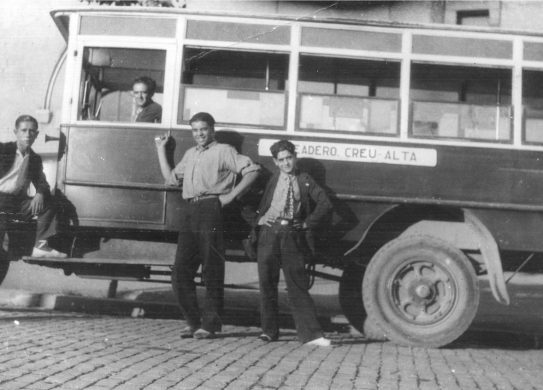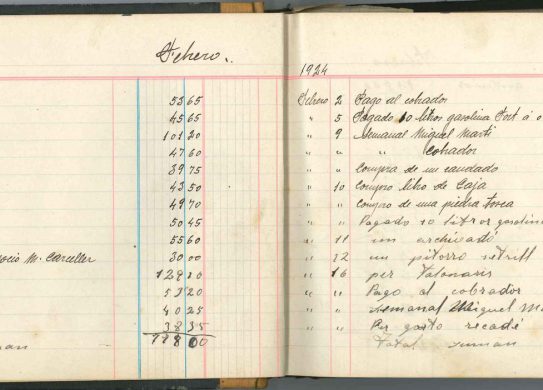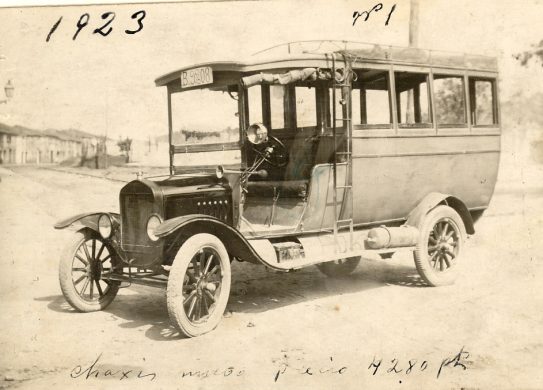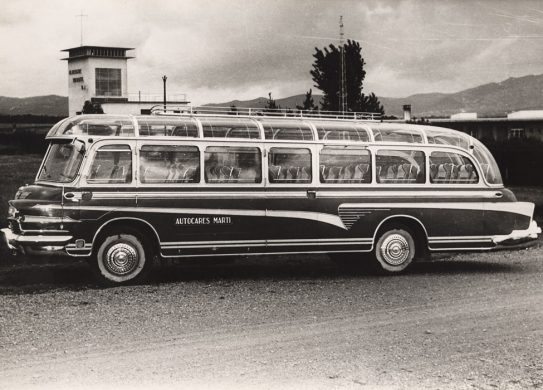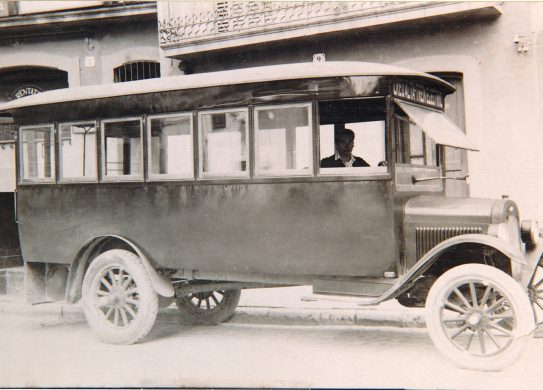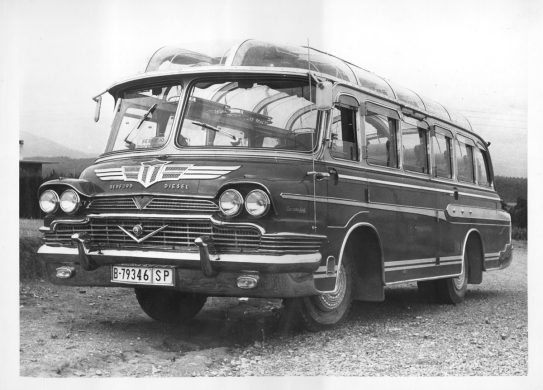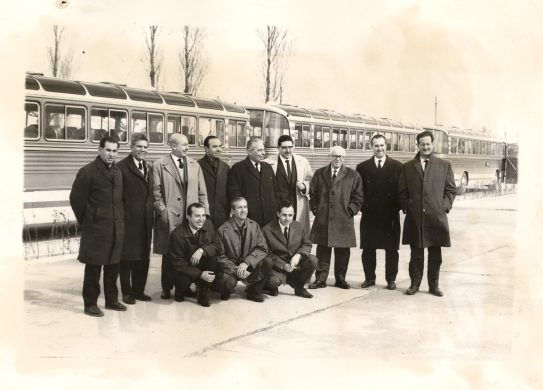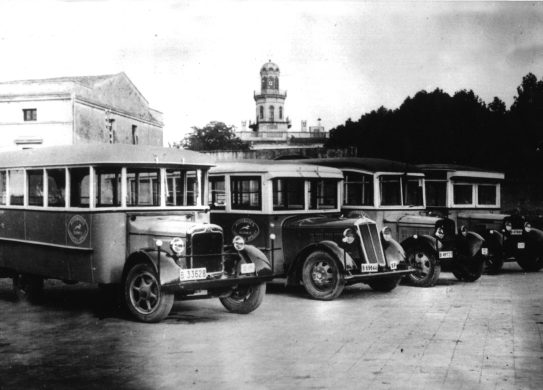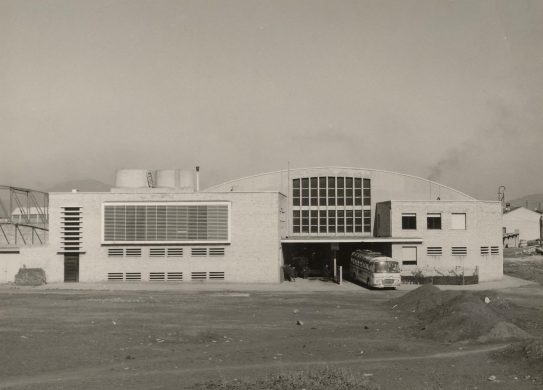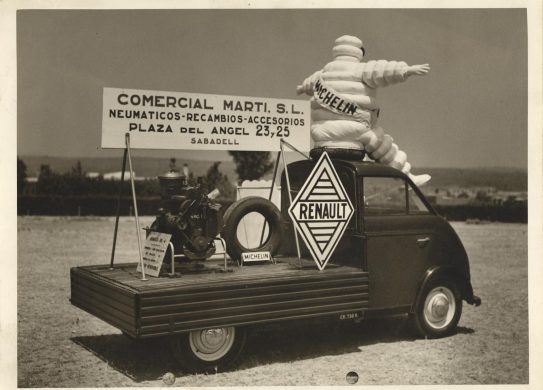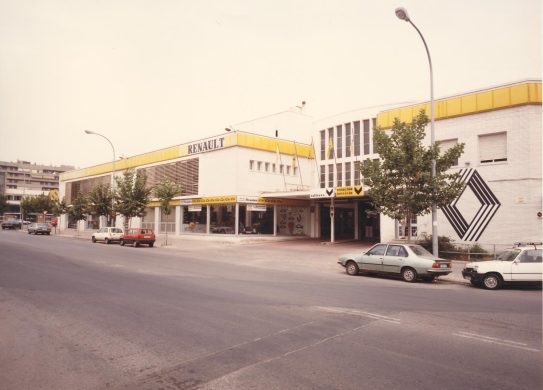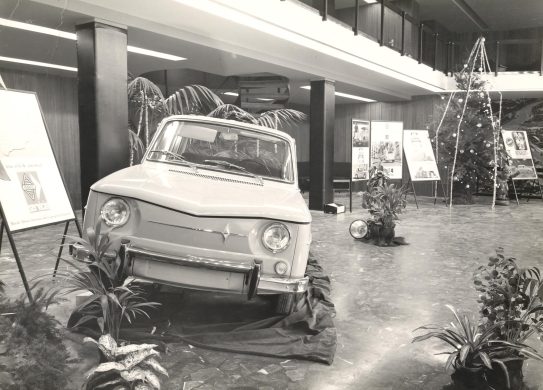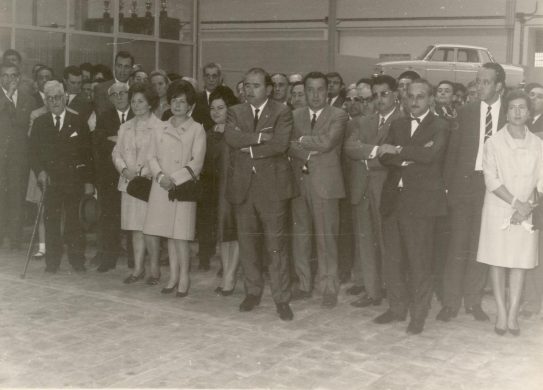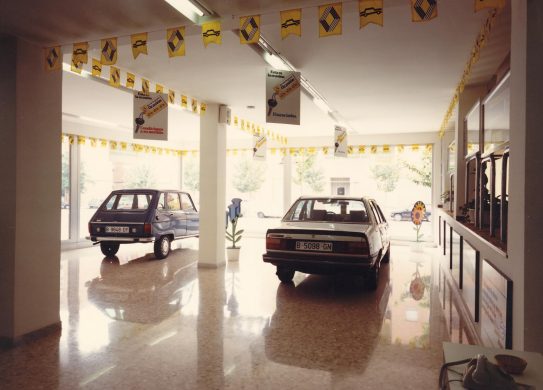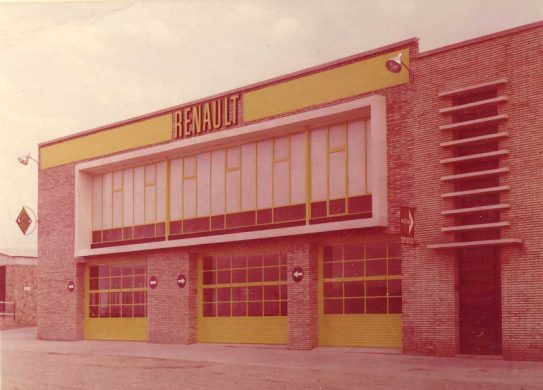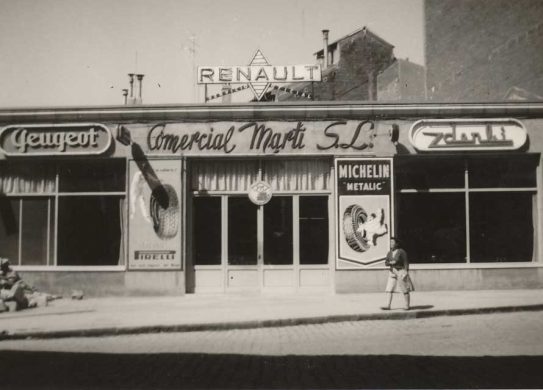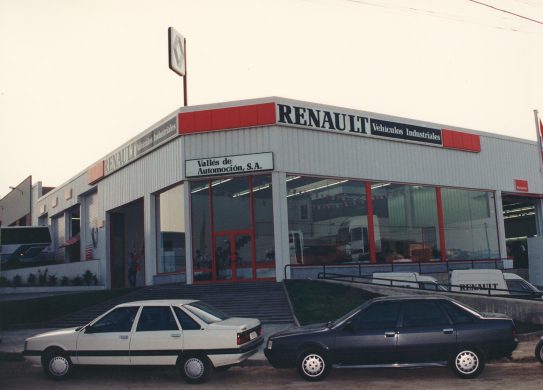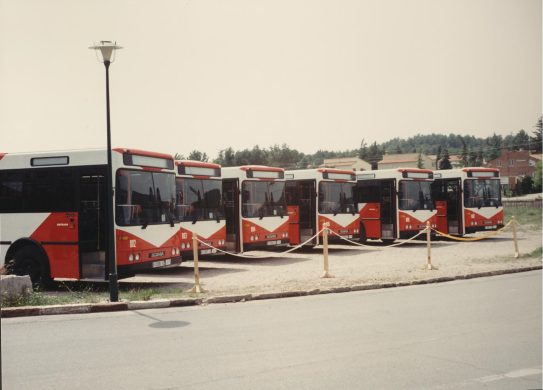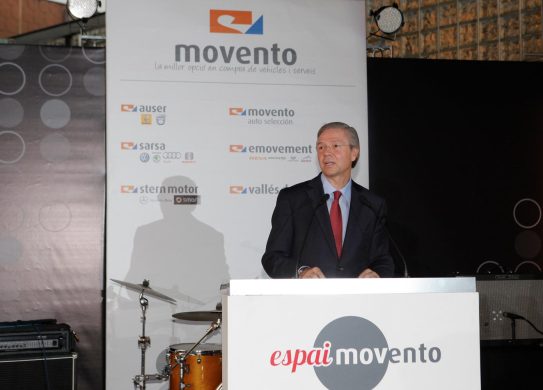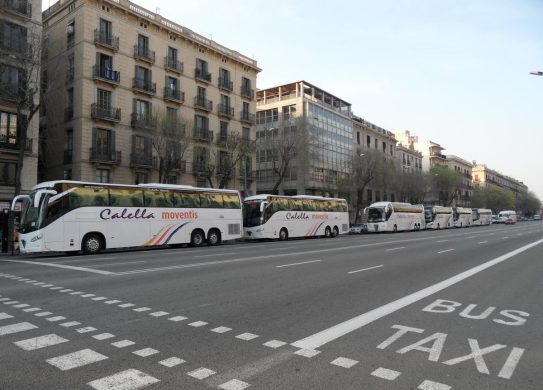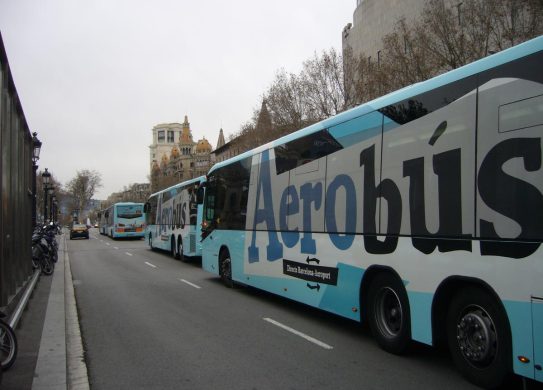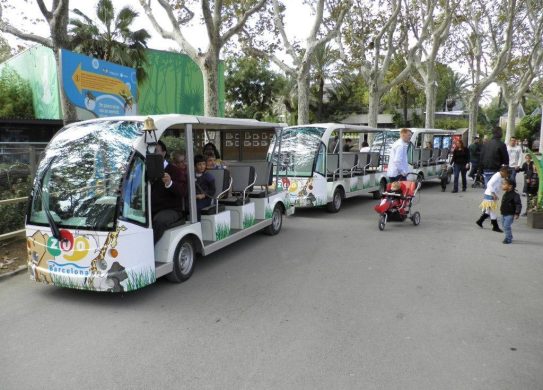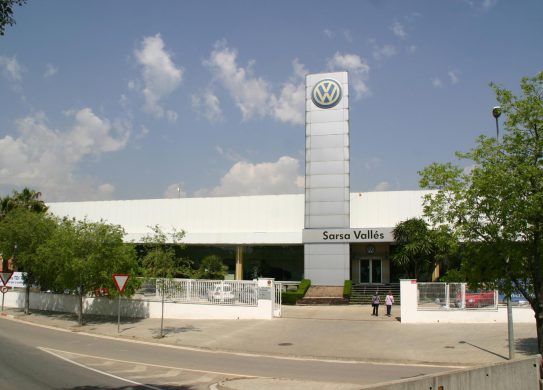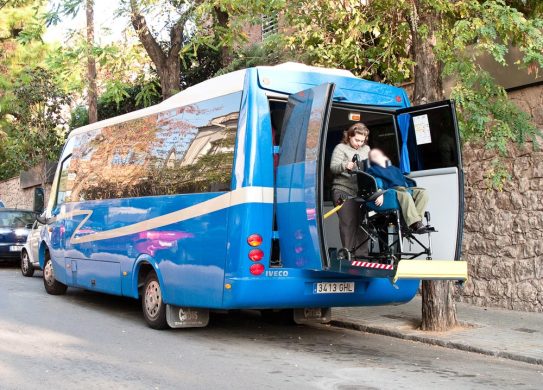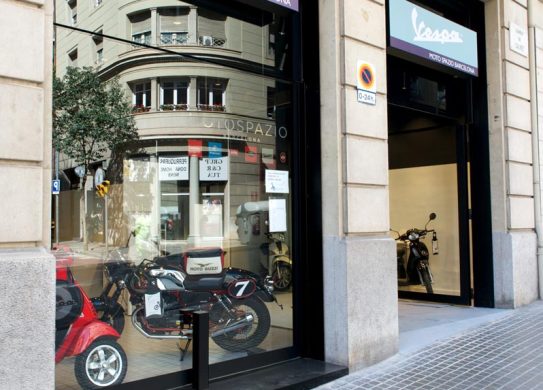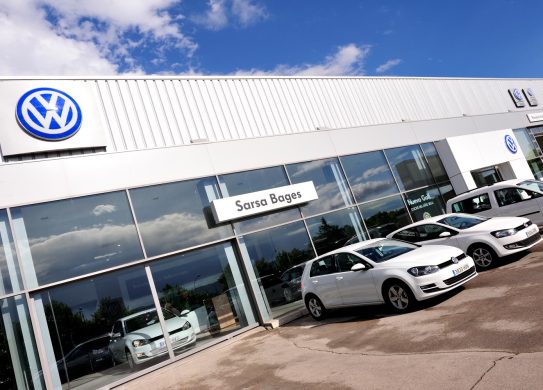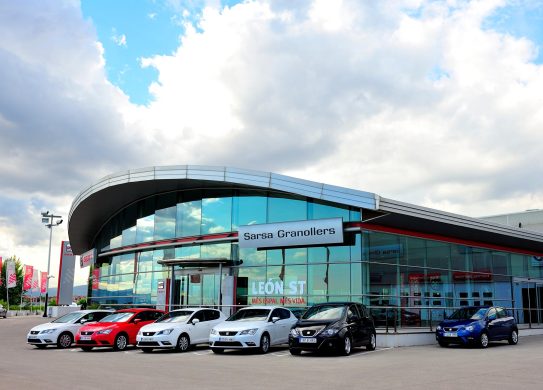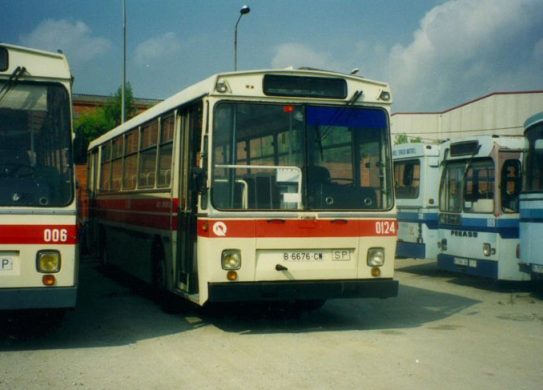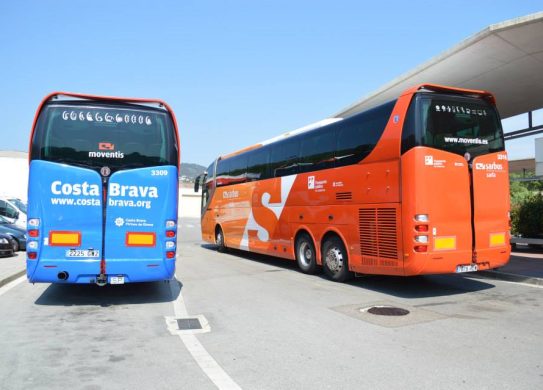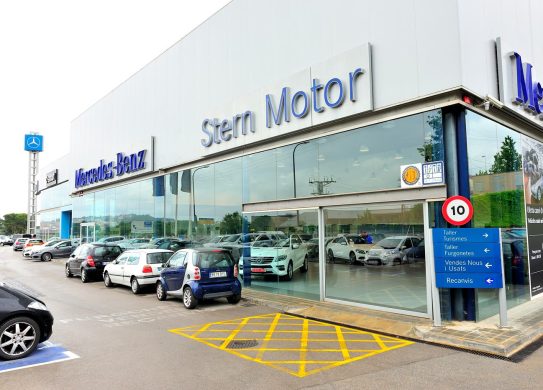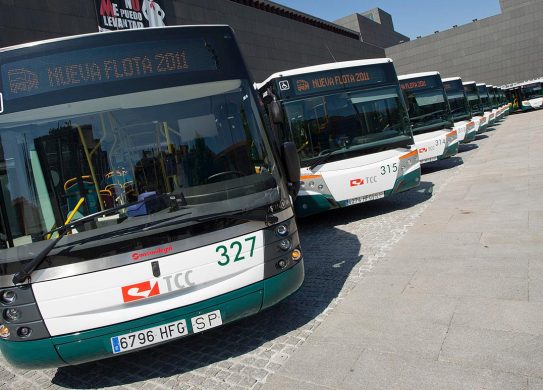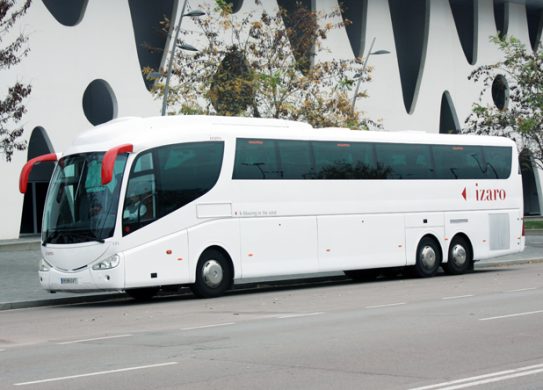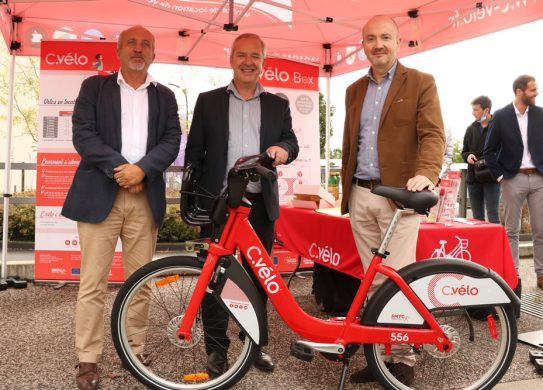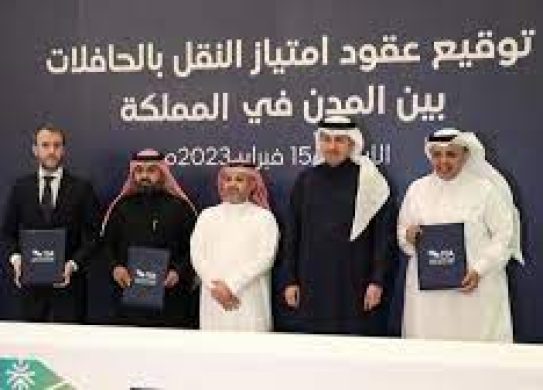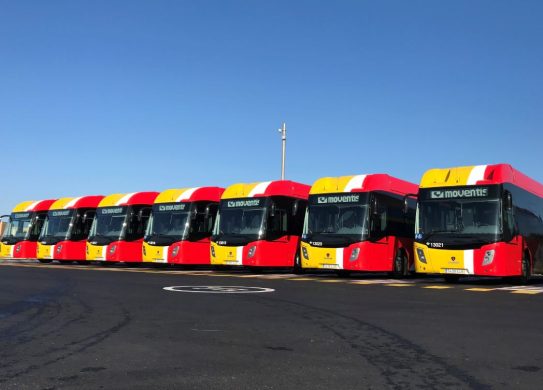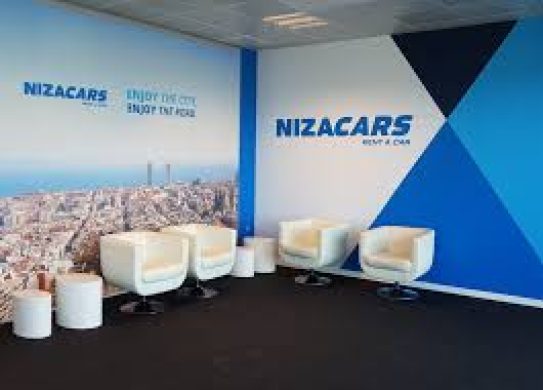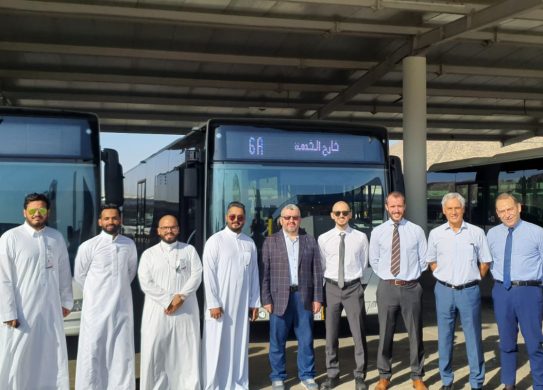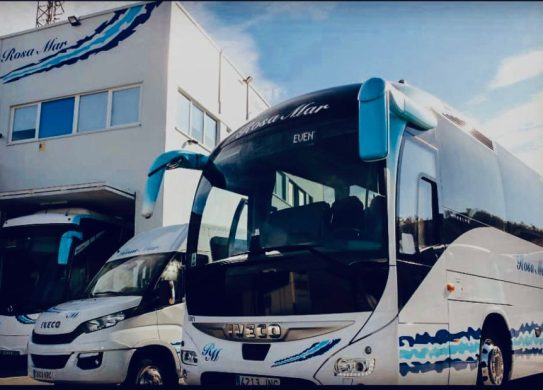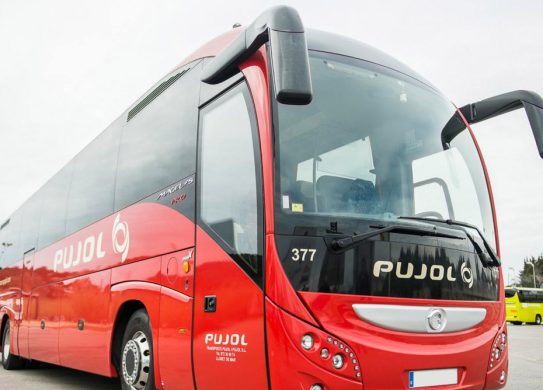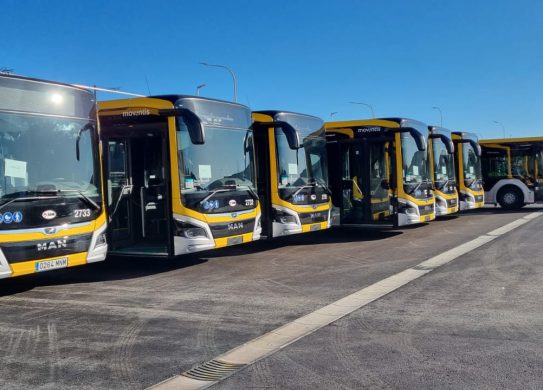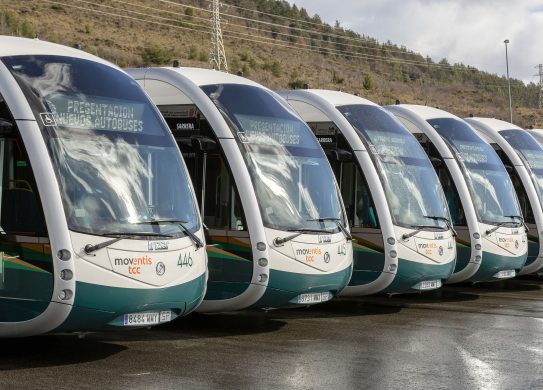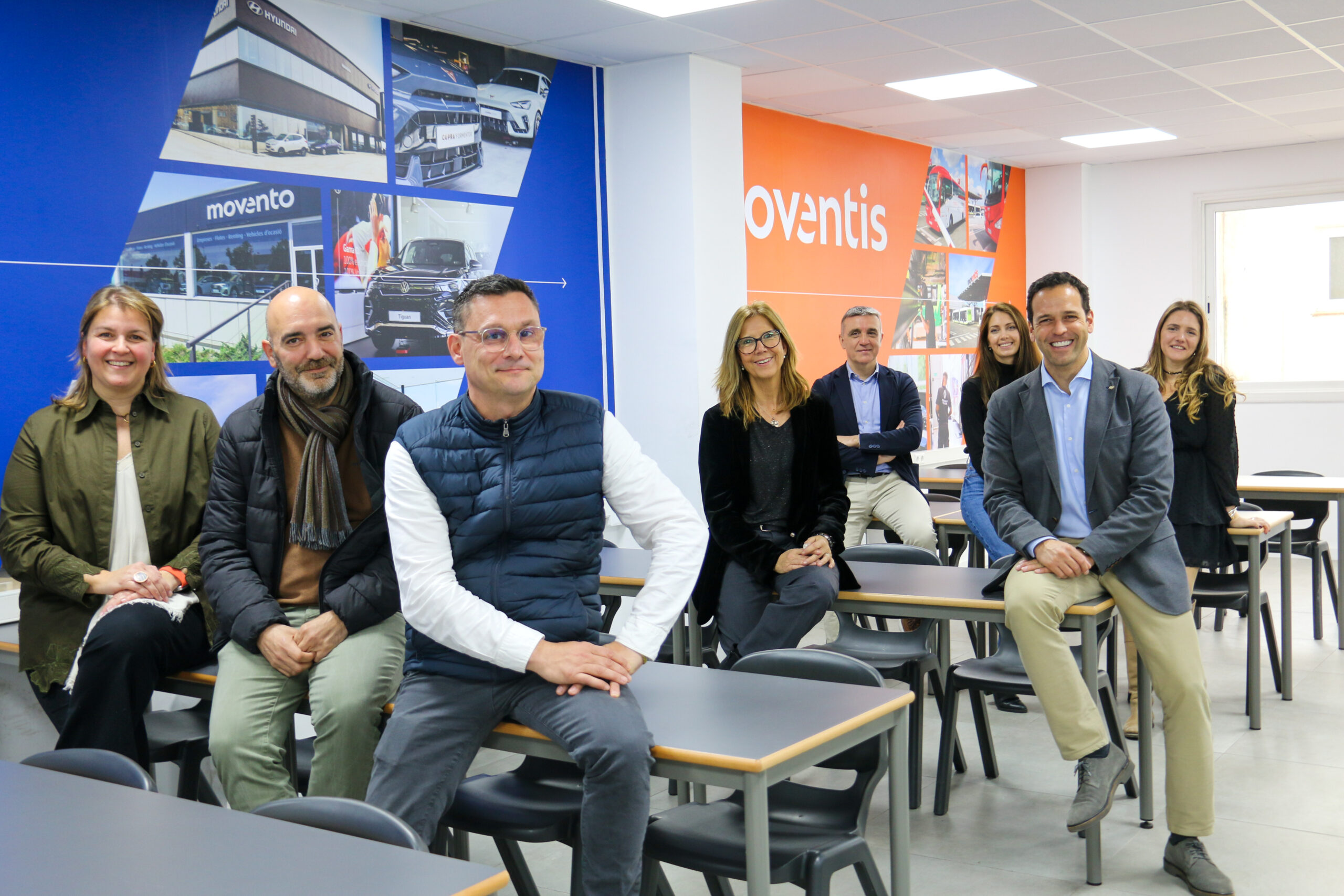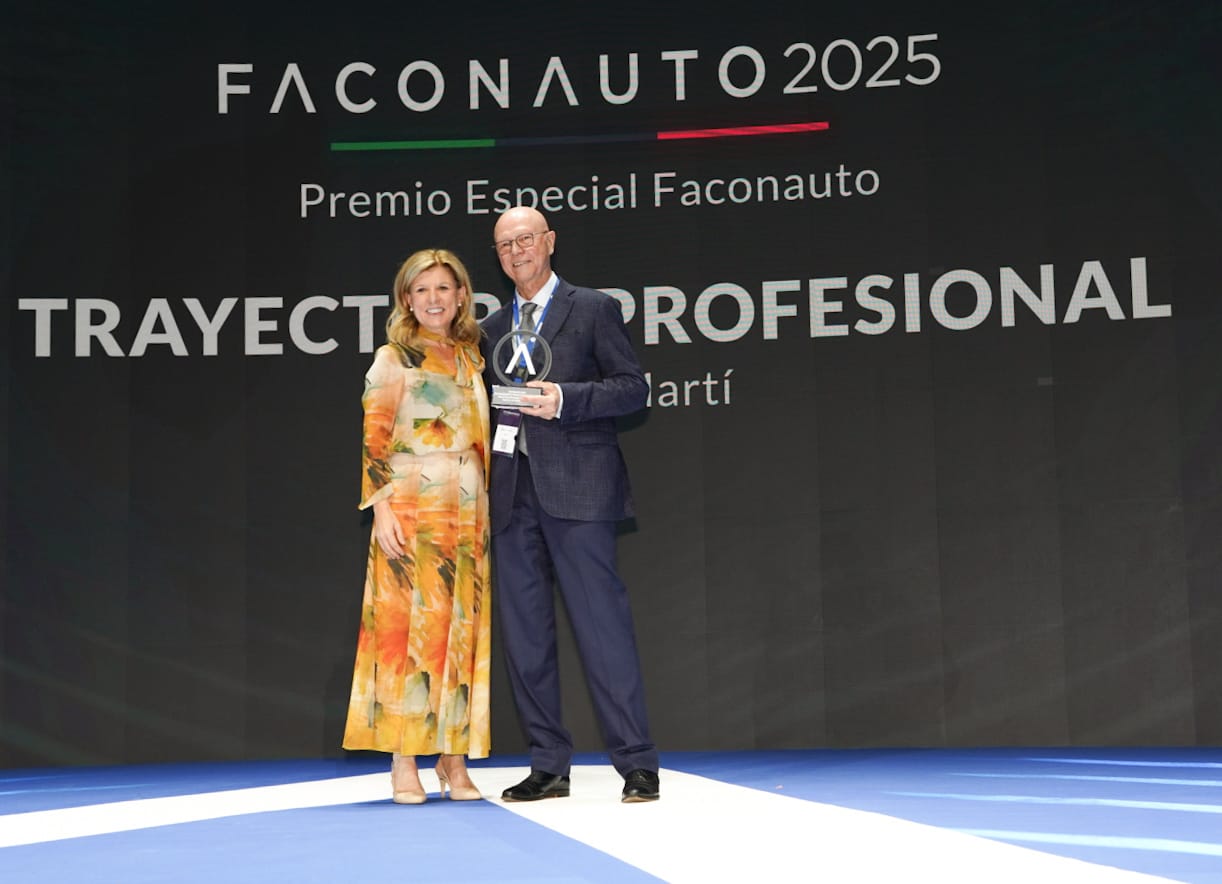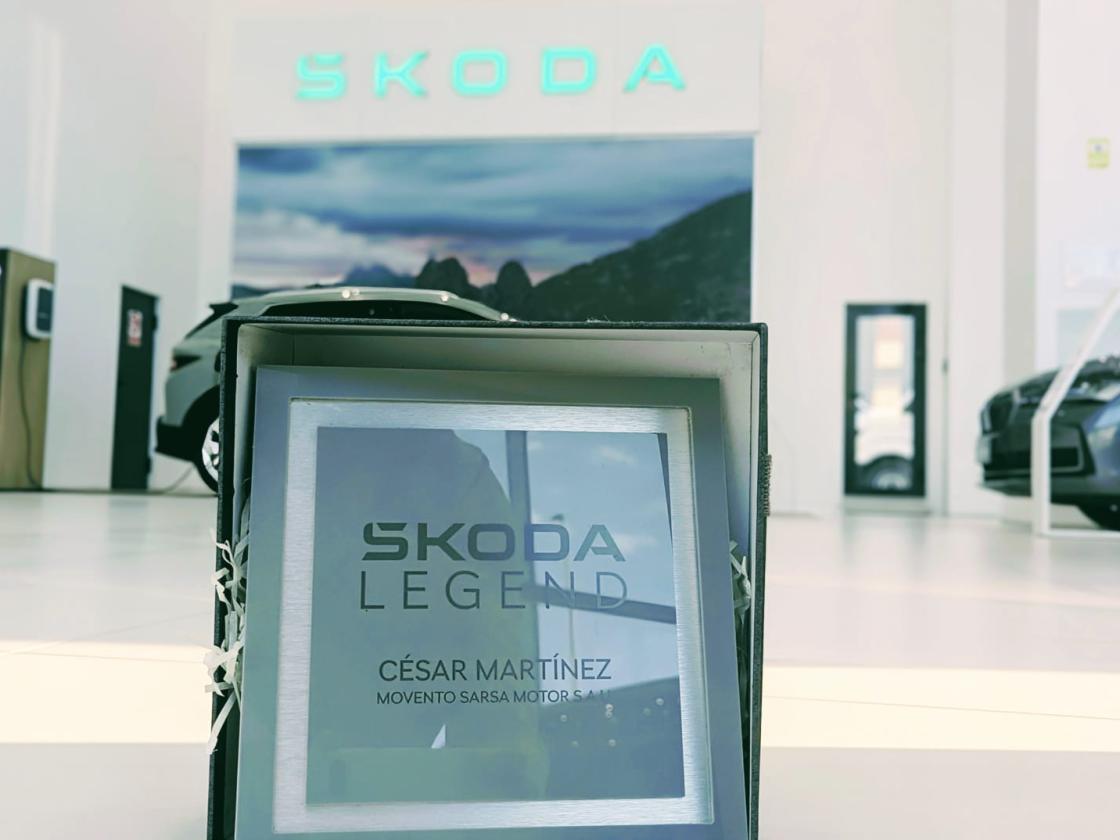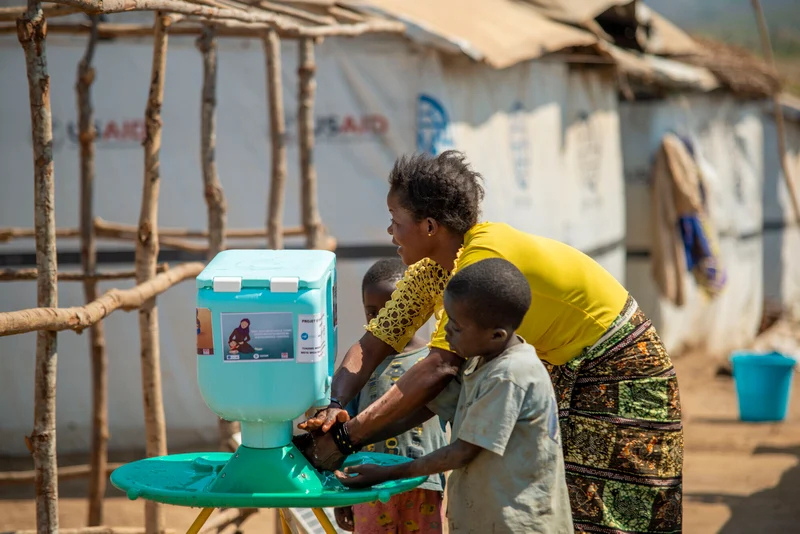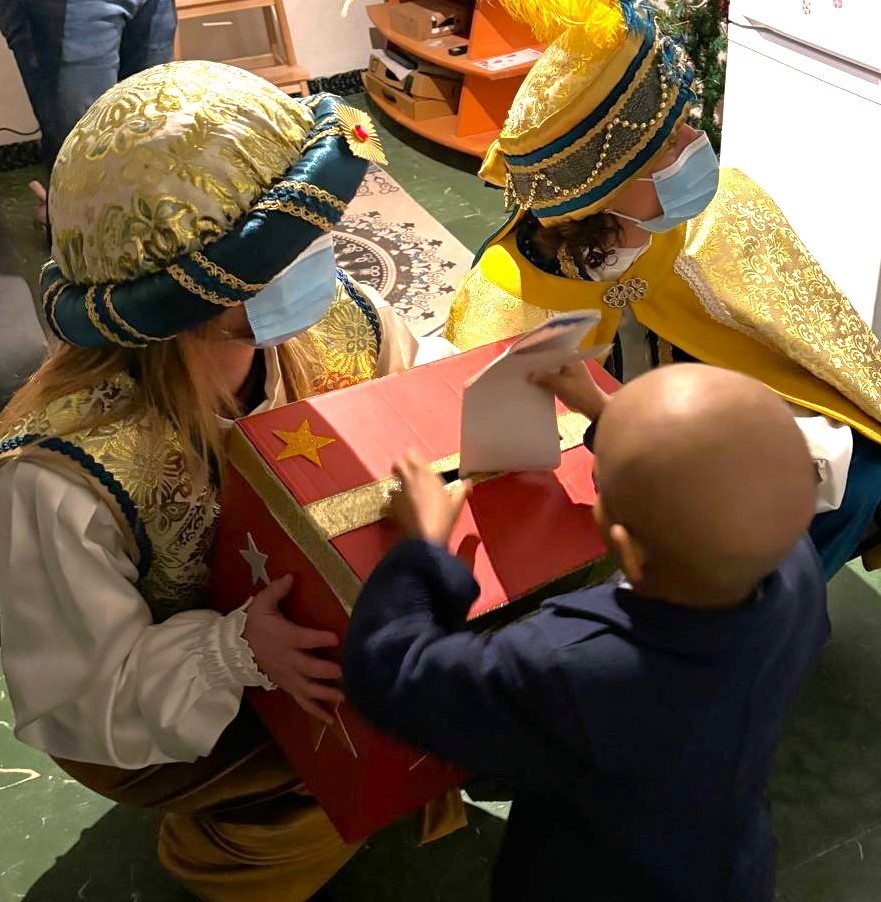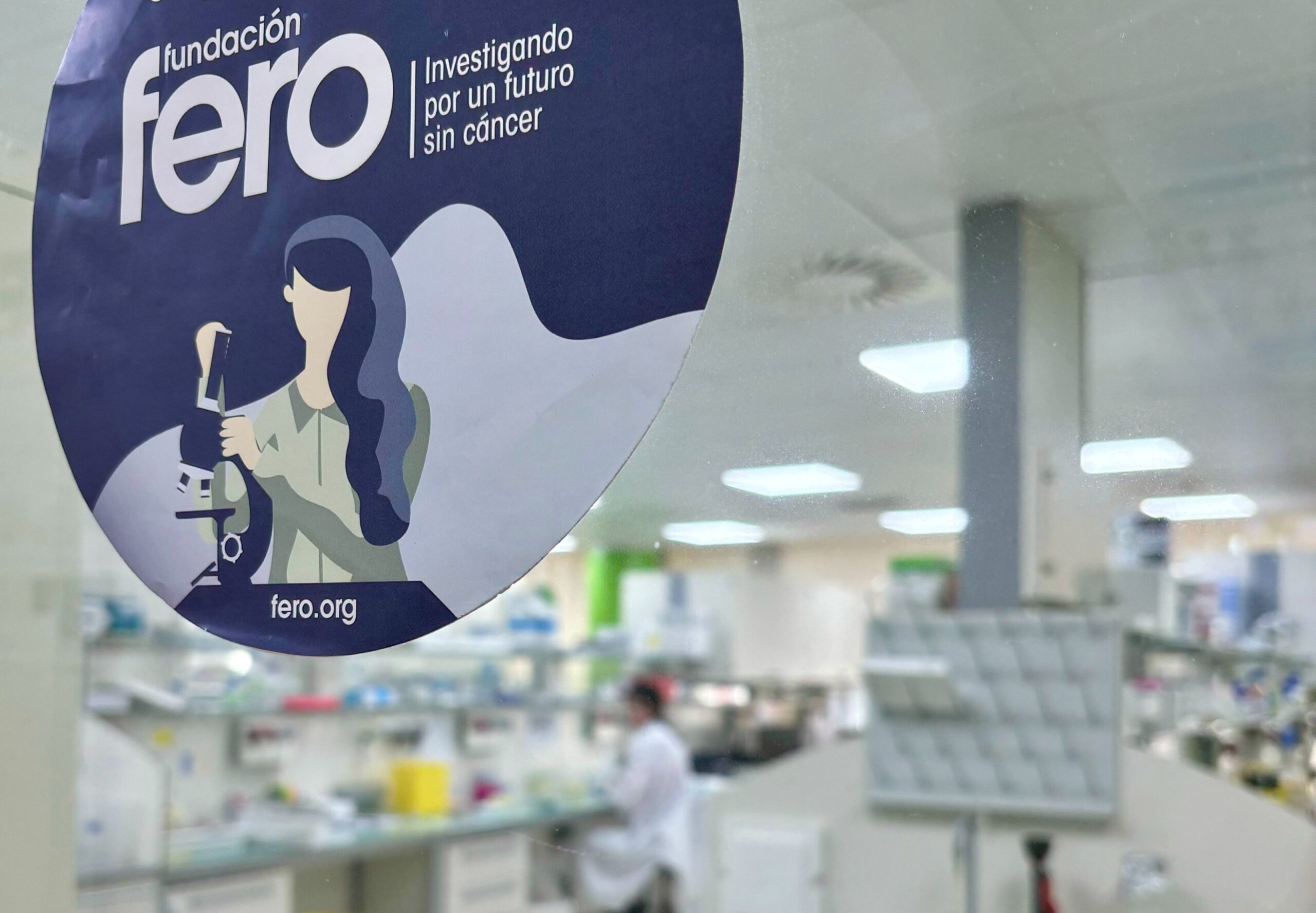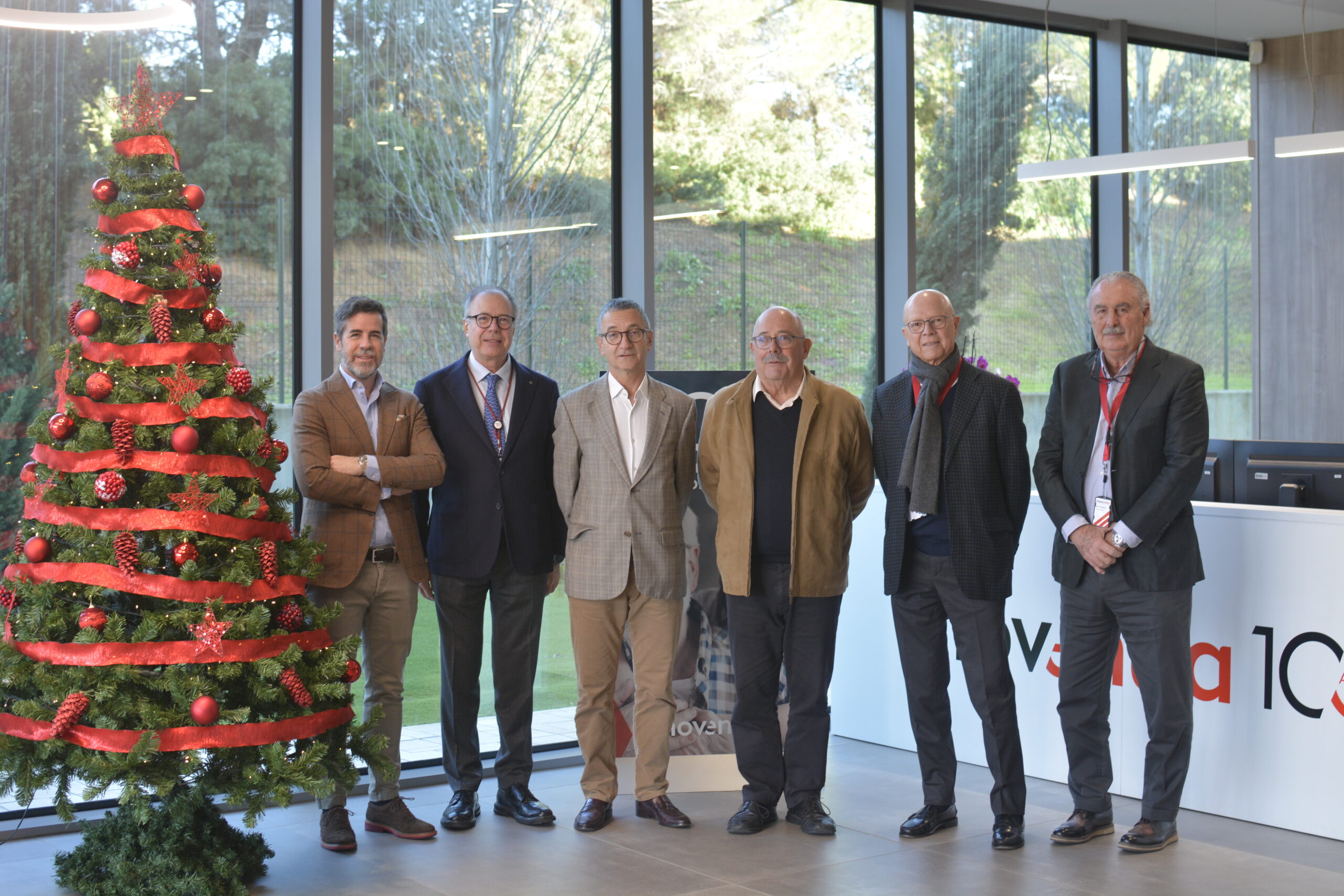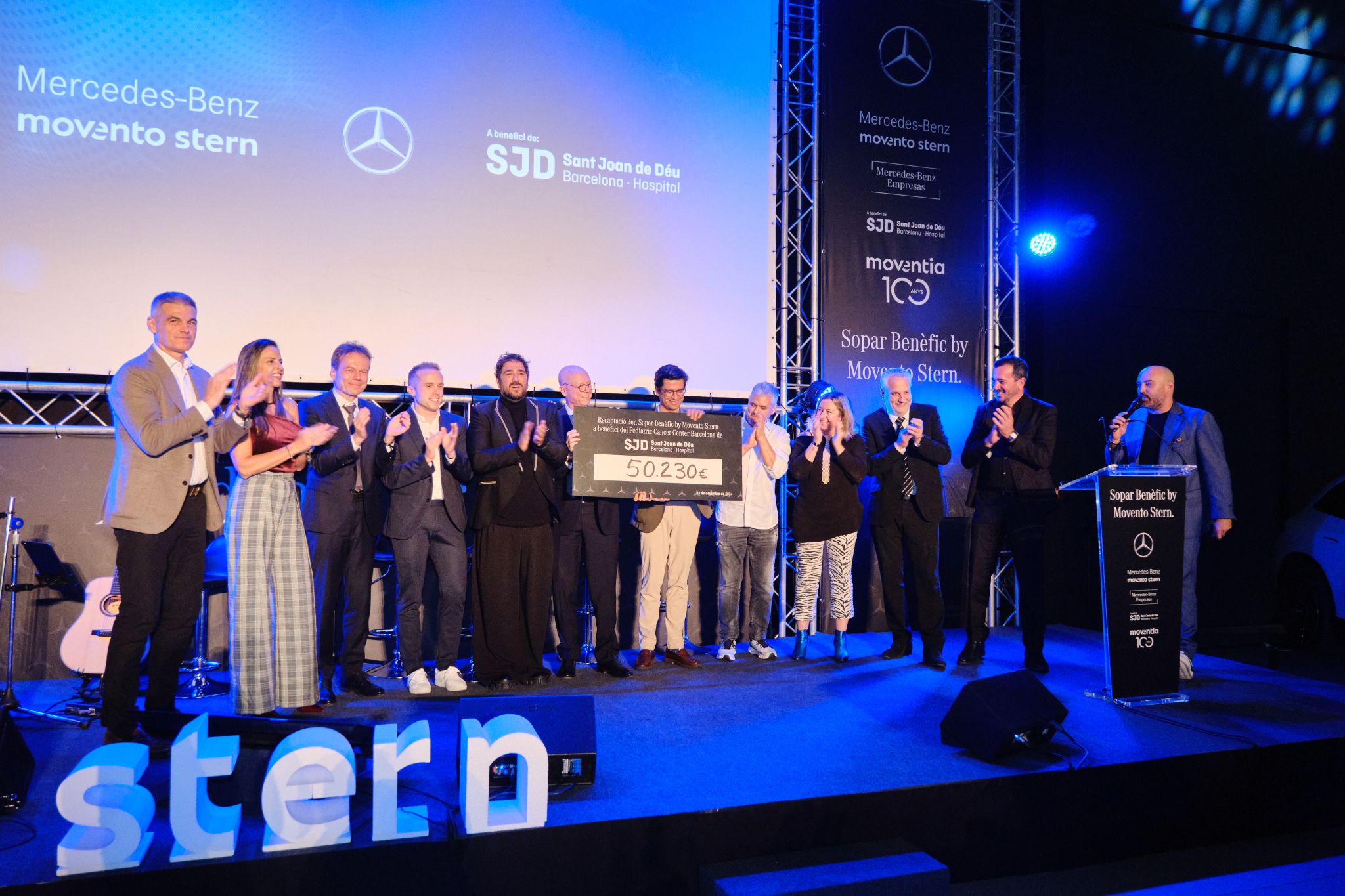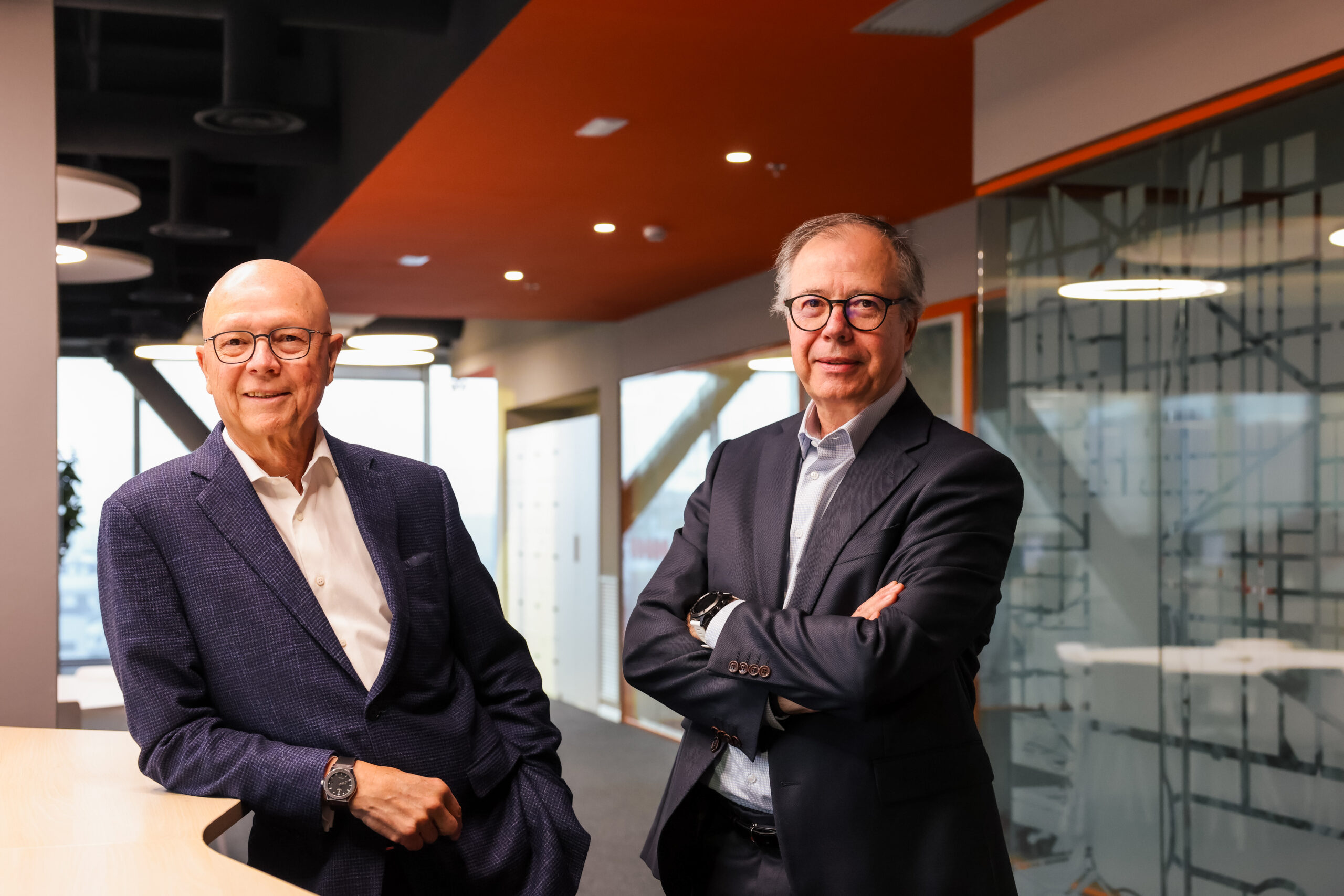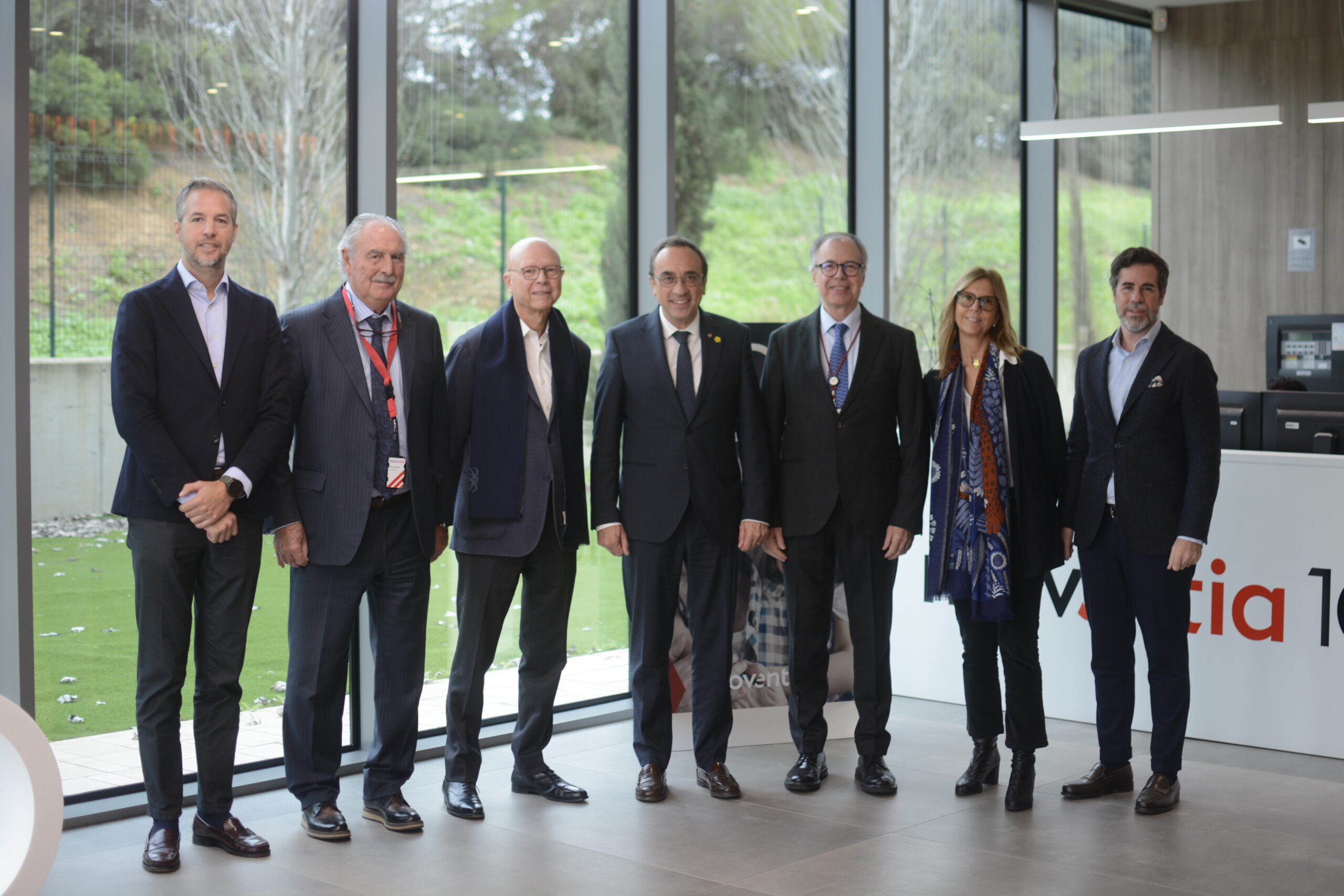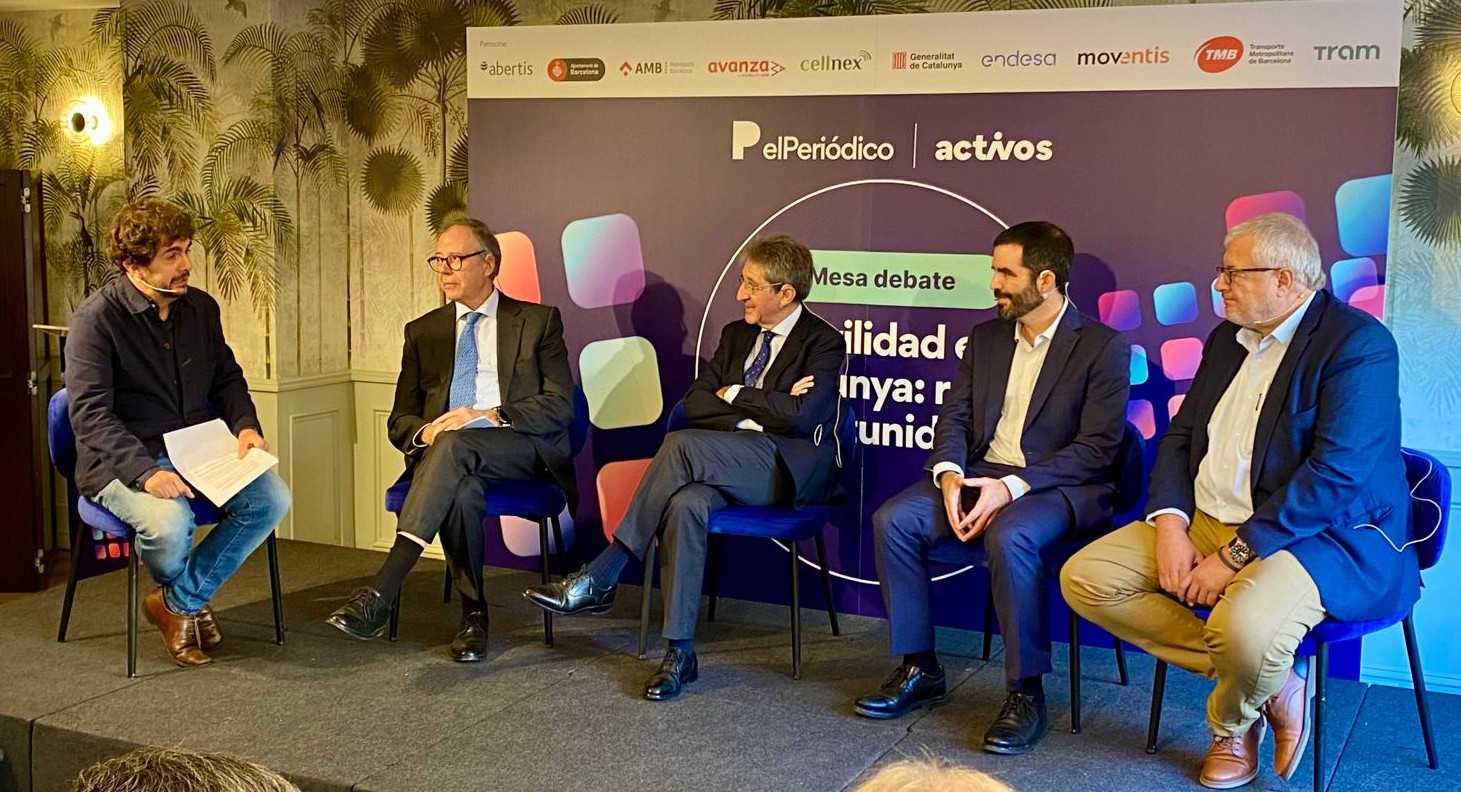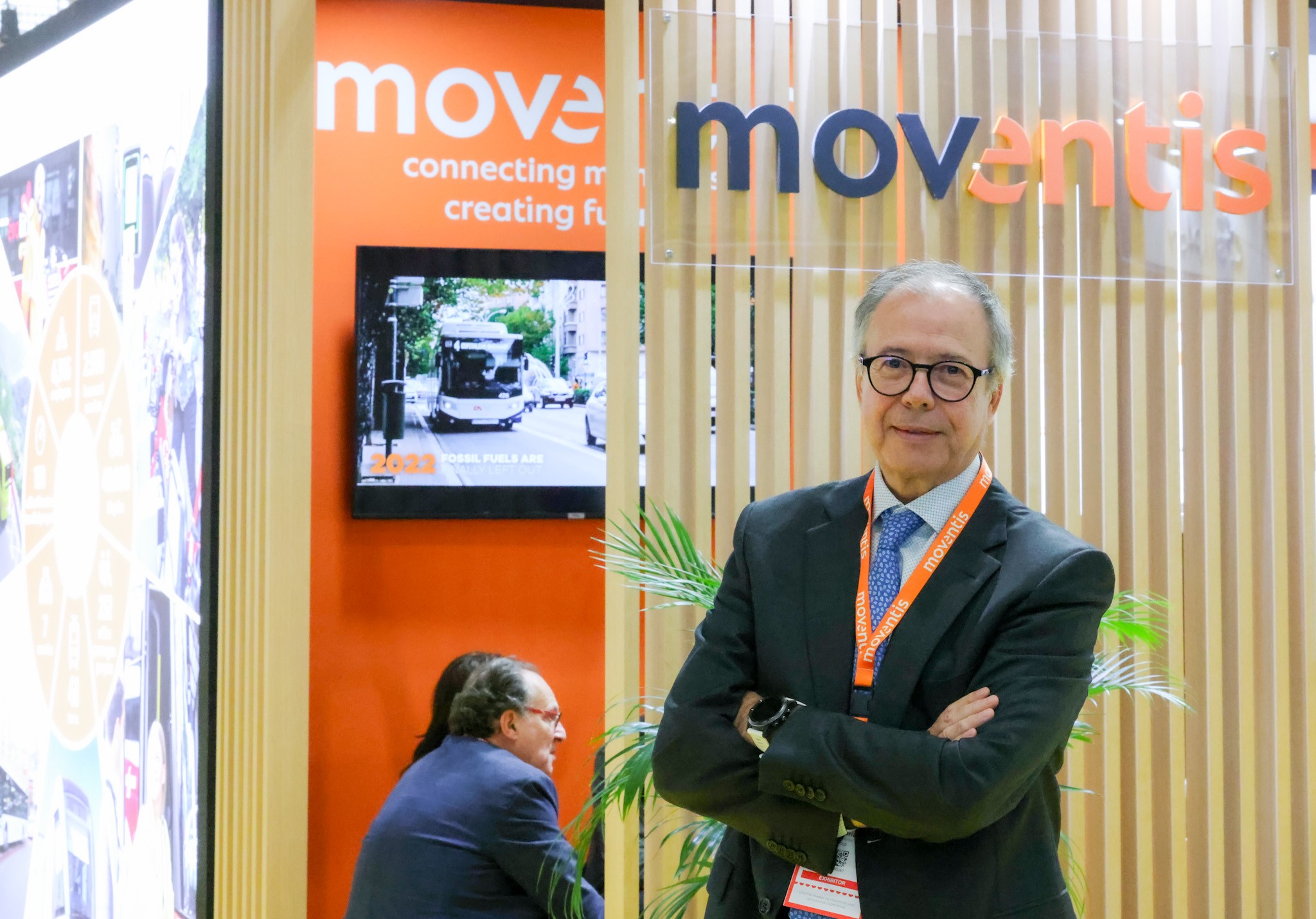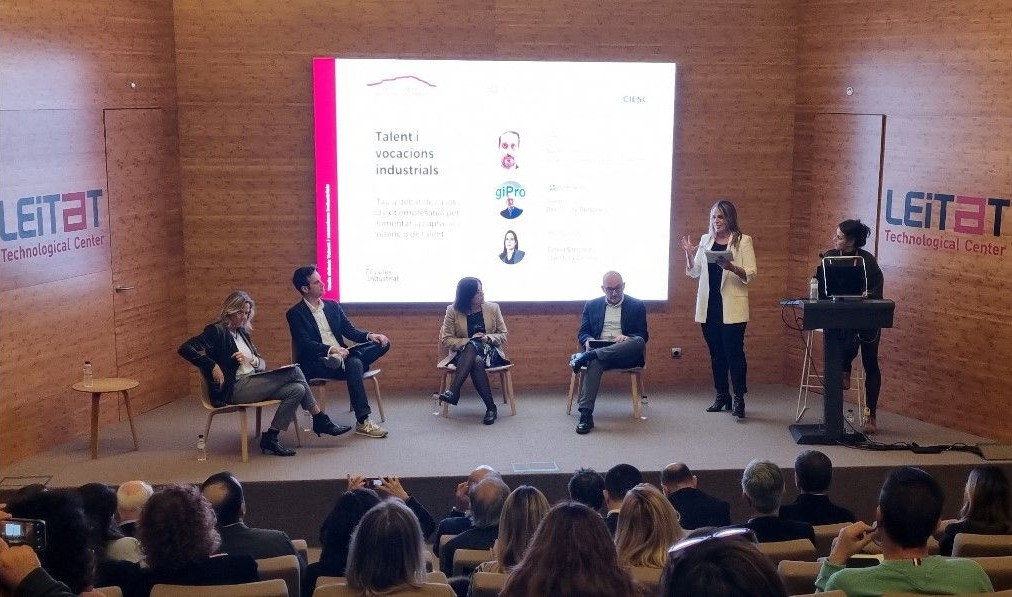History
History of Moventia
The Martí family has been driving the mobility sector in Catalonia since 1923, consolidating its service, developing new lines of business and embarking on major international projects, all the while maintaining a firm commitment to quality, innovation and sustainability.
1923-1939
PHASE ONE
Miquel Martí Adell, founder of the group
The first steps were taken after Miquel Martí Adell set up the company in 1923 with just one city bus in Sabadell, as well as a small vehicle repair shop in the same city. The Martí family took their venture to the next level in 1933 by buying the Barcelona bus line known as La Catalana. Positive growth by the company – now with 50 employees and 15 buses – was cut short in 1936 when it was ‘collectivised’ following the outbreak of Civil War in Spain. Fortunately, Miquel Martí Adell was able to keep hold of his repair shop and that meant he was at least able to look after his family.
1923
Foundation
In 1912, aged just 16, Miquel Martí Adell moved from his home town of Morella (Castellón) to Sabadell in search of new opportunities. A few years after settling in Catalonia, in 1920, he was called up for military service, where he was trained as a vehicle mechanic and driver. After getting his licence, he seized the moment and bought his first bus: a Ford Tipus T with the number plate B-9208. With that bus in 1923, he began operating the first urban bus route in Sabadell, ‘Creu Alta-Apeadero’.
1927
Comercial Martí
Following his first steps into the urban transport sector in Sabadell, Miquel Martí Adell decided to open a new line of business in 1928 called ‘Reparaciones de vehículos Manel Carceller Milián’, known today as Comercial Martí. The business specialised in selling, repairing and retreading tyres, as well as selling spare parts and accessories for the automotive sector. Today, almost 100 years later, that project has been transformed into the Movento group, a benchmark in the mobility sector with extensive international operations that continues to grow thanks to innovative vision, hard work and dedication, all values passed down by its founder.
1929
Urban transport concession in Sabadell
After the Barcelona Civil Government granted the Martí family company a contract to provide transport services from Sabadell to Matadepera and from Sabadell to Santa Maria de Barberà in 1926, and after another transport operator at the time – Joan Puig – sold his business to Miquel Martí Adell, Sabadell City Council granted Martí an exclusive concession to provide urban transport services between Creu Alta and Creu de Barberà for five years in 1929, with possible extensions. This is how the company began providing urban transport services to the city of Sabadell.
1930
Barcelona
In 1933, the Martí family transport company took one of its first steps towards expanding its services in Catalonia by buying a bus line popularly known as La Catalana. This line ran between the districts of Poblenou and El Clot, making it the family-run company’s first venture into the Catalan capital.
It was an expensive acquisition, costing roughly 70,000 pesetas at the time, but the contract included the line’s 10 Hispano-Suiza and Chevrolet buses.
The line, which ran all the way to Mar Bella beach during the summer and where long queues of waiting passengers would form, remained in operation until 1982, when it was absorbed by TMB (Transports Metropolitans de Barcelona).
1940-1950
PHASE TWO
Reconstruction and rebirth of the company
The end of civil war in Spain concluded three years of conflict and brought another tough period in Spanish history: the dictatorship. Miquel Martí Adell regained ownership of his transport company and some of the confiscated vehicles, which, despite their poor condition, he was able to repair and put back into service. Following several months of hard work, the transport company was able to resume operation but was forced to deal with a fuel shortage and a lack of essential materials for transport stemming from the restrictions and international isolation imposed on the Spanish state.
1950
Only urban operator in Sabadell
Following the Civil War, Autobusos Sabadell resumed its services under some precarious business operating conditions because the concession had been declared ‘expired’ when the conflict began.
Once the fuel supply began to return to normal, Miquel Martí Carceller, the second generation of the family in the company (1939-1950) alongside his brother Heribert, saw the need to update the fleet and acquired 10 Hispano-Suiza vehicles at an equipment auction by the Ministry of the Army. In January 1950, Mrs Eulàlia Alari, owner of the two bus lines run by La Transversal, sold the concession and rights to operate the service she had been granted by Sabadell City Council, as well as her four vehicles, to Miquel Martí Adell. With this purchase, the Martí family transport company began to cover the route between Creu de Barberà and the Estación del Nord RENFE train station, along the Barcelona motorway. This meant that the Martí family was the only transport company operating in Sabadell.
1951-1979
PHASE THREE
Expansion by the group
The group of companies owned by the Martí family harnessed the industrial and economic growth opportunities of the time and began a period of expansion led by the second generation of the family, with Heribert and Miquel Martí Carceller at the helm. The group began to grow beyond the borders of Catalonia and took over the urban services in Córdoba and Zaragoza. The automotive branch also continued to grow after being promoted from an official Renault agency in Sabadell to official dealership.
1954
Concession in Sabadell for 25 years
In the 1950s and early 1960s, Sabadell became a powerful hub of industry, attracting immigrants from all over looking for work. Buildings were constantly popping up on the outskirts of town, creating new suburban districts that needed a new mobility strategy. So, in 1953, the City Council held a public tender to run a unified urban bus service in the city.
The tender was awarded to Miquel Martí Adell for 25 years with a possible five-year extension and not to exceed 50 years in total, which was the maximum allowed under the Local Governance Act. This concession was a huge milestone and brought immense joy to the Martí family, which had been wanting to regulate its transport service in the city for some time now.
1964
First Renault garage in Sabadell
Renault came to Spain in the early 1950s, but it came as no surprise to the Martí family. They were fully aware of the trend thanks to the charter services the company was operating across Europe.
Although the company had seen an upward trend in its automotive branch in recent years through the sale of cars and motorcycles from various brands, such as Mercedes, Sava Austin, Renault, Peugeot and Derbi, Heribert Martí began talks with Renault that would be decisive in making Comercial Martí a SAVA subagent for Renault sales and repairs in Sabadell.
After being named official agents, Heribert took over this new business area while his brother Miquel remained in charge of the collective public transport business. After years of hard work, the Martí family opened the first Renault garage on their premises on Calle Papa Pius XI in Sabadell.
1966
Comercial Martí Renault Dealership
The strong ties forged by Heribert Martí with Renault led the Martí family to become official dealers of the brand in Spain, but on one condition: they could only sell vehicles from the French brand. In 1966, when the deal was reached, Comercial Martí went from being an official agent for Renault in Sabadell to the brand’s official dealership.
That same year, they opened a huge car showroom in the city and started selling and repairing Renault vehicles on their premises on Paseo del Comerç the following year. That service is still there today.
1972
AUCORSA TUZSA
In the 1970s, Eladio Macho, who managed the urban bus concession in Córdoba (Autobuses Urbanos de Córdoba – AUCORSA), told Miquel Martí he was interested in selling that company as it had fallen on hard times.
The Sabadell-based businessman and the men who managed the passenger transport company in Vigo and the transport companies in Oviedo travelled to Andalusia to assess the situation. Eventually, in 1972, Miquel Martí Carceller and his partners took over AUCORSA. Martí and a partner took a 40% stake each and another business group took the remaining 20%.
This process, under which Martí was appointed managing director, was the family’s first partnership with other business owners. It was also the first step in the company’s expansion beyond Catalonia.
In December of the same year, Martí and his partners in the Córdoba venture completed a new transaction that would cement their growth: acquisition of the historic tram company Los Tranvías de Zaragoza (TUZSA).
1976
Renault Cerdanyola
10 years after Comercial Martí became an official Renault dealership, and thanks to its growth in the city of Sabadell, the family-run company decided to expand its business by opening its first dealership outside the city, in Cerdanyola.
The new premises, reflecting the Catalan company’s partnership with the French brand, had the same floorspace it still has today: 3,000 m2 over two levels.
1980-1990
PHASE FOUR
Another downturn and a strong recovery
The Martí family lost the urban transport concession in Sabadell, a project that had underpinned the company since its early days. This threatened the very survival of the business and came as a tough blow. The solution to staying alive in the sector involved merging the family business with Renom Bus. From this agreement came the Sarbus Group. Over time, this group would go on to become one of the benchmark transport operators in Catalonia. Growth was also achieved within the automotive branch by winning the official Renault Industrial Vehicles concession for Sabadell and Terrassa.
1982
Loss of the Sabadell urban transport company and new opportunities
A desire for municipal authorities to take over public services arose during the 1980s. This led to the loss of Autotransports Martí, which had been providing the urban transport service in the city of Sabadell, as well as the urban transport service in Córdoba. Although these losses represented a threat to the very survival of the company, the situation was overcome and it emerged stronger thanks to a regional growth and diversification process in its business.
1983
Vallès Automoció
In the early 1980s, the Renault Industrial Vehicles group acquired the old Eduardo Barreiros factory in Villaverde, Madrid, where the first lorries manufactured were Barreiros-Dodge bearing the Renault logo. Comercial Martí, already an official Renault car dealership at the time, decided to make a bid to provide sales and repair services for Renault industrial vehicles in Sabadell and Terrassa.
The manufacturer accepted the proposal. Confirmation of this deal led to the creation of Vallès Automoció on 23 November 1983, a business that is still standing today. Four years later, the service was expanded to include a new branch offering service in Terrassa, with a showroom and garage for Renault lorries and vans.
1984
La Vallesana
Following the loss of a major cornerstone for the company, the challenge and a will to grow and keep the group alive remained strong and faithful to its beginnings and corporate legacy. Facing a difficult situation, the solution involved looking for partnership opportunities between the two companies providing intercity services in El Vallès Occidental: Autotransports Martí and Renom Bus.
As a result, Miquel Martí Escursell and Josep Renom found some common ground and the two companies bought La Vallesana in 1984, which had been set up in 1914. This was the oldest operator in El Vallès Occidental and ran routes from Castellar del Vallès to the cities of Sabadell, Terrassa and Barcelona.
1985
Merger of Sarbus and La Vallesana
After acquiring La Vallesana, the Martí and Renom families bought Transgo, the company that provided service between Sabadell, Terrassa and Martorell. The new organisation was finalised in June 1985 under the name Martí Renom SA, although they decided to use the brand name Sarbus for commercial purposes.
Over time, Sarbus came to offer 90% of all intercity services between El Vallès Occidental and Barcelona. It also created a line connecting Sabadell and Barcelona, becoming a transport benchmark in El Vallès Occidental. In 1990, Sarbus started providing urban transport services in Sant Cugat del Vallès and expanded its existing line to reach the Autonomous University of Barcelona (UAB) in 1995, serving Barcelona – Cerdanyola del Vallès to the university.
1991-2014
PHASE FIVE
New organisation and management model for the group
During this fifth phase in our history, the third generation of the Martí family led by Miquel, Josep Maria and Sílvia Martí Escursell, undertook a major business expansion project. Due to a change in the shareholders of Sarbus and Transportes Ciudad Condal, the group went from a shared form of management with other partners to being the only private shareholder. This required an internal restructuring process that produced Moventia, with a new corporate organisational structure that was capable of consolidating its position and taking on new expansion challenges, both nationally and internationally, through the two business divisions: Moventis, with expertise in collective mobility; and Movento, for the private mobility business.
The rise of the fourth generation of the family into the group was also consolidated at this stage, led by Miquel Martí Pierre and Santi Colomer Martí.
1991
TCC Tomb-Bus Aerobús
In the 1990s, a clear need arose to continue modernising transport in order to adapt this service to new mobility demands. Those demands led the Regional Parliament of Catalonia to pass a law creating Entitat Metropolitana de Transport (EMT). This would cover 18 municipalities and replace Corporación Metropolitana de Barcelona.
When the Olympic Games came to Barcelona, EMT held a tender for Tomb-Bus – a microbus service running between Plaza Catalunya and Plaza de Pius XII – and Aerobús – a bus connecting Barcelona Airport to the city centre. The bid presented by a temporary joint venture (UTE) between Martí Renom and Transportes Urbanos de Zaragoza (TUZSA) was awarded both services. Shortly after, the company Transports Ciutat Comtal SA (TCC) was created out of that joint venture.
It began operating in March that same year, with Martí Renom (Sarbus), Transportes Urbanos de Zaragoza (TUZSCA) and Transports Metropolitans de Barcelona (TMB) each holding a 33% stake. 15 years later, the Martí family bought out the other privately owned partners and has been the sole private partner in the company ever since, with 66%.
1992
Renault Ronda Ponent and Renault Badalona
With the inauguration of El Eix Macià in Sabadell in 1992, which brought the construction of a huge avenue intended to be one of the main transport and shopping arteries in the city, Comercial Martí decided to open new premises there. This resulted in the new Renault Ronda Ponent building, with 3,200 m2 of cutting-edge installations and a huge showroom featuring the whole Renault line.
A serious recession at the time meant that many dealerships were failing. Among them were Renault Badalona and Renault Santa Coloma de Gramenet. The French brand needed solid business groups to rebuild its empire in Catalonia and offered Comercial Martí the dealerships in those two cities. As a result, in October 1992, the family-run company obtained the licences and set up the companies Betauto (Badalona) and Tasanco (Santa Coloma de Gramenet).
1994
Mercedes Benz Stern Motor Sabadell
27 years after Comerciales Martí was named an official Renault dealership, the Martí family was able to increase its presence in the automotive sector by representing other brands.
In 1993, after a serious crisis in the sector, Mercedes-Benz Spain asked the group to start distributing Mercedes in Sabadell and Terrassa.
The proposal from Mercedes-Benz gave Movento its first opportunity to diversify and, to that end, it set up Stern Motor – the official Mercedes dealership in the area and still the benchmark for Mercedes and Smart vehicles in the El Vallès area, among the company’s other lines of business.
TCC Vilanova
On 1 July 1994, the City Council of Vilanova i la Geltrú granted Transports Ciutat Comtal (TCC) the concession to run its urban transport service. A few years later, in 2006, that service joined the integrated fare system with the urban bus network and the RENFE rail, metro, bus and tram services in the Metropolitan Area of Barcelona (AMB), allowing passengers to use the whole AMB public transport system with a single travel card and paying only once.
1996
Empresa Casas
Sarbus, which was set up following the agreement between the Renom and Martí families, made a historic acquisition in 1996: the legendary Empresa Casas. Based in Mataró, this company owned 40 vehicles and covered passenger transport services between Mataró and Barcelona and between Vilassar de Mar, Premia de Mar and the Catalan capital. It also ran intercity services connecting all the cities in El Maresme with Mataró.
After completing the acquisition, the Martí family decided to keep the legendary name and took a large majority stake in the capital, becoming its main shareholder.
Empresa Casas was bought out when the company was in a delicate position due to strong competition from RENFE. Nevertheless, some important initiatives – such as reorganising the line, changing the arrival routes into Barcelona city centre and upgrading the fleet – made it possible to regain passenger volume. At present, Empresa Casas holds the concession for intercity transport services between El Maresme and Barcelona and urban transport services in several towns around the region, with a network of seven daytime lines and two night bus routes that carry more than 3,000,000 passengers each year.
1998
Urbà Sitges L82 Port Zal
Since July 1998, Transports Ciutat Comtal (TCC) has also been providing urban services in Sitges, a municipality forming part of the integrated fare system of the Metropolitan Transport Authority of Barcelona (ATM).
Its fleet was updated in 2011 and three new hybrid buses started covering urban lines in the town. Adding these electric vehicles has cemented the company’s desire for progress towards electro-mobility.
In the same year that TCC began providing urban services in Sitges, the operator took over service on Line 88 from the Barcelona Port Authority, which runs from Avinguda Paral·lel in Barcelona to inside the city port. Called Port Zal, this service is mainly used by city port workers and employees of the companies based at the logistics hub (Zona de Actividades Logísticas – ZAL).
1999
Catalana de Camions Mercedes
Stern Motor, the official dealership of the Movento group engaged in the distribution, sale and repair of cars, vans and lorries from the Mercedes and Smart brands in Sabadell and Terrassa, joined forces with other partners (Eduardo Velasco, now Nayper Motor; Garatge Plana and Autosuministros Motor) in 1999 to create Societat Catalana de Camions.
This organisation was created to become the official dealership for Mercedes-Benz lorries in the provinces of Barcelona, Lleida and Girona, and is one of the most important in the country today, both in units sold and turnover.
2000
Sarfa
The acquisition of Sarfa in 2000 was a major milestone in Moventia’s business growth and consolidation. As was the case when Transports Ciutat Comtal (TCC) was set up and Empresa Casas was bought out, the Renom family decided to take a minority stake in the purchase of the legendary Sarfa company based in Palafrugell and connecting nearly all the towns in Alt and Baix Empordà (Costa Brava) with Barcelona via scheduled routes and urban and intercity transport services.
This operation led to a huge improvement in service and future stability that the group so greatly needed, as well as the consolidation of its ties with the Costa Brava, a region that the Martí family had always considered their second home.
TCC Authosa
Authosa was another of the companies acquired by Transports Ciutat Comtal in the 2000s. The company, which runs urban services on Lines 85, 86 and 87 in the Horta and Carmel districts of Barcelona, was one of the most heavily used services by residents in the area, who were used to the steep, narrow streets of this hillside area.
More specifically, Line 86 connects Calle Tajo with Calle Calderón de la Barca and is fundamentally a ring-route around the area. In turn, Line 87 connects Calle Tajo with Plaza Gala Placídia, passing through Carmel and connecting it to Horta and the city centre. These lines fall under an administrative concession from the Metropolitan Area of Barcelona (AMB).
First metropolitan tram
The tram was very important in Barcelona’s mobility sector during the first 30 years of the 20th century, its golden age, but vehicle traffic came to dominate the structure of the city’s roads and relegated the tram to a secondary role. From 1990 onwards, when works were done to reduce traffic and improve public spaces, the tram was put back on the table. The Metropolitan Transport Authority agreed to hold a tender to award management of this service to a private company.
Moventia took part in the first ideas contest and formed part of the temporary joint venture to build, finance and operate the tram, which had to connect Avenida de la Diagonal with Sant Just Desvern, Sant Joan Despí and Cornellà de Llobregat. The mobility company submitted its bid and won.
Launching intercity night buses
With high demand in the Barcelona Metropolitan Region, where residents had repeatedly expressed a need for intercity night buses, the Directorate-General for Ports and Transport approved 17 regular lines in 2001 to cover routes between the centre of Barcelona and various towns in the metropolitan area. This service was added to the integrated fare system.
At present, the Moventis companies (Sarfa, Sarbus, La Vallesana, Casas and Lleida) currently carry over 300,000 passengers a year via this service on 22 lines in El Vallès Occidental, El Maresme, Gironès, Alt Empordà, Baix Empordà and Segrià. Furthermore, night services in Pamplona (managed by TCC) carry 610,000 passengers a year on 10 lines.
Urbano Cerdanyola
The line taken over following the merger of the Renom and Martí families, which became Sarbus, began operating the network of urban buses in the city of Cerdanyola del Vallès in 2000.
With three urban lines, this service carries roughly 238,000 passengers a year. With both urban and intercity lines, Cerdanyola enjoys a great public transport service that is highly-valued by the local population.
2001
Consolidation and reorganisation of the Renault network, Auser
In 2001, when Renault began to consolidate and reorganise its dealership network in Spain to strengthen its structure, the French brand once again put its trust in the Moventia group. In July 2001, it proposed creating a single entity for all the Renault dealers in Terrassa, Rubí, Sant Cugat, Badalona and Santa Coloma de Gramenet.
After lengthy negotiations, the family acquired Izquierdo Gacesa (July 2001), which owned the Renault dealerships in Terrassa, Rubí and Sant Cugat, and Automòbils Delmar (2002), the dealership in Mataró. After acquiring the companies, an agreement was reached with the García family that owned the dealerships in Calella and Pineda to create the Auser company.
Under this agreement, Auser became the second-largest Renault dealer in Spain with dealerships in Sabadell, Cerdanyola, Terrassa, Rubí, Sant Cugat, Santa Coloma de Gramenet, Badalona, Mataró, Calella and Pineda de Mar. Having built such a strong position with the Renault brand and in the areas mentioned, the group cemented its place as one of the benchmark operators in the sector.
2002
Auser
Auser is the company under the Movento umbrella engaged in the distribution, sale and repair of cars and vans from Renault and Dacia.
The company operates in El Vallès Occidental (Sabadell and Terrassa), El Barcelonès Norte (Badalona) and El Maresme (Mataró, Pineda de Mar and other nearby towns).
Since it was set up in the early 2000s, Auser has provided the best service and quality to its customers, which include individuals, companies and leasing firms, through a team of more than 140 people at 10 locations.
TRAM
The tram concession was awarded to Moventia in 2004, bringing the Martí family (via one of its companies) into one of the groups that would submit a bid for the tender.
The Barcelona tram was awarded in 2000 for a period of 28 years. This was a huge step for the group, which since then has been in charge of operating and maintaining the two tram networks alongside the Spanish/French joint venture Detren, owned by FCC and Veolia. The result brought the Martí family into the world of trams and demonstrated its desire to remain part of the sector.
Sant Sadurní urban service
In the early 2000s, the company created out of the merger between the Renom and Martí families began operating its services in more and more parts of Catalonia.
Specifically, in 2002, Transports Ciutat Comtal (TCC) was awarded the concession from Sant Sadurní d’Anoia Local Council to operate a bus line connecting the town centre to the local RENFE train station. This service joined the ATM integrated fare system in 2008.
UTE Trambaix concession
After being awarded the tram (a great step forward for the Moventia group that made it responsible for operating and maintaining the service and representing its début with this means of transport, thereby demonstrating its desire to remain part of the sector) the temporary joint venture (UTE) created between Moventia, FCC and Veolia was awarded the concession for Trambaix in 2002.
This tram network connects Barcelona to El Baix Llobregat and began operating in April 2004. Nearly two decades later, it now stretches to the neighbouring cities of L’Hospitalet de Llobregat, Esplugues de Llobregat, Cornellà de Llobregat, Sant Joan Despí, Sant Just Desvern and Sant Feliu de Llobregat, covering a distance of 15.1 km with 29 stops.
Stern Motor Terrassa
On 1 February 1994, Stern Motor opened new premises on Calle Venus in Terrassa. Eight years later, enjoying the same boom that resulted from setting up the Stern Motor dealership in Sabadell and thanks to the confidence placed in the Martí family by Mercedes-Benz Spain, Movento saw the need to open new premises in Terrassa.
The new Stern Motor Terrassa building was opened on Avenida del Vallès in the same city to serve as an official distributor for the Mercedes and Smart brands in the fields of private cars, light and heavy industrial vehicles. This business is now a benchmark dealership for the Mercedes brand in El Vallès Occidental.
2003
Lleida urban service
The Moventis group was awarded the concession to provide urban services in the city of Lleida in April 2002. Due to the privatisation of services, the municipal authorities decided to update the fleet so as to provide residents with the best service and as many lines as possible running as often as possible.
Two years later, the city pioneered the implementation of contactless tickets, which can be topped up easily online. The website also provides users with all the information they need on timetables, routes, transfers, tickets and fares, etc.
20 years later, the Lleida urban transport service, operated by Moventis, has 10 lines connecting the various parts of this city.
Creation of TRAM Besòs
After being awarded the tram (a great step forward for the Moventia group that made it responsible for operating and maintaining the service and representing its début with this means of transport, thereby demonstrating its desire to remain part of the sector) the temporary joint venture (UTE) created between Moventia, FCC and Veolia was awarded the concession for Trambesòs, as well as Trambaix, in 2002.
The Trambesòs network, which connects Barcelona with the Barcelonès Nord area, was finished in 2004 and added four new stops. It currently provides a connection between Barcelona, Sant Adrià del Besòs and Badalona over a distance of 14.1 km with 27 stops.
2007
Acquisition of the Sarsa Group
Stemming from the strategic need for growth identified by the group within the motor vehicle distribution sector, and due to the entry into force of new European motor vehicle distribution regulations on 1 October 2001, which allowed dealerships to represent more than one brand, the purchase of Sarsa Group was finalised in April 2007.
Sarsa is the dealer for Seat, Audi, Volkswagen and Skoda in several municipalities around El Vallès Occidental and El Bages.
This acquisition included the official dealerships and garages for Volkswagen in Terrassa and Castellar del Vallès; Audi in Terrassa, Castellar del Vallès and Manresa; Skoda in Sabadell and Terrassa; and Seat in Sabadell. Following the takeover of Sarsa, the group went from representing two brands to representing eight brands in the territories under its control.
Emovement
When electric mobility became one of the big challenges facing the automotive industry, Moventia saw that renewable energy was a clear way forward. In order to help bring electric vehicles to the Spanish market, a new company was created under the name Emovement. This company specialises in sustainable mobility and became the official importer of the REVA electric vehicle for Spain, Portugal and Andorra in 2007.
Emovement has been part of Vol-Tour ever since, the Catalan association that promotes electric vehicles and aims to promote, raise awareness and encourage research and development.
Mercedes Stern Motor Sabadell Ronda
In 2007, 14 years after Mercedes-Benz Spain suggested that the Martí family distribute the Mercedes brand in Sabadell and Terrassa, creating the Stern Motor dealership, the company was forced to consider relocating again.
Due to space requirements, the legendary garage that had always been on Calle Papa Pius XI in Sabadell was moved to Calle Moratín and the old car showroom was relocated to Ronda de Ponent, in the same building.
2008
Renault Mataró
Years after the Moventia group acquired Automòbils Delmar together with other companies to set up Auser and group all the Renault dealerships together, it made another move in 2008 to strengthen its operations in the area.
Automòbils Delmar opened new premises in the Hortes Industrial Park in Mataró, replacing its previous premises in Cabrera de Mar. This move strengthened the Auser group’s business in El Maresme.
2009
Movento Autoselección
Movento Autoselección was created in 2009 after the companies in the Moventia group were restructured, specifically the Movento business unit.
This entity was created with a clear purpose to centralise services for all the dealerships selling used and/or semi-new vehicles, seeking to establish synergies and make management as efficient as possible while projecting a unified, consistent image of the group to internal and external customers.
Emovement promotes electric mobility
The Movele Plan was launched in 2009, a pilot project undertaken by the Spanish Institute for Energy Saving and Diversification (IDAE) to promote electric mobility in which Emovement played an active role. Among other things, the Movele Plan included the installation of recharge points for electric vehicles in major cities throughout Spain.
Emovement has made a contribution and a strong commitment to putting the electric vehicle concept firmly in the minds of the Spanish people and politics. Today, the group continues to support the implementation of new technologies and enjoys a strong presence in the world of sustainable mobility.
TCC Pamplona urban service, Aena T1 and T2, SGMT Aerobús and Autocares Poch
In August 2009, Transports Ciutat Comtal reached a new milestone when it won the public tender for public passenger transport in the city of Pamplona and the 17 municipalities within its association of municipalities.
The service was awarded for a period of 10 years (commonly known as Las Villavesas) and included transport in the city of Pamplona and the neighbouring municipalities with an estimated 37 million passengers a year on 23 urban lines with a fleet of 140 buses.
This agreement saw the company grow 20% and cemented its desire to expand beyond Catalonia.
The shuttle buses between terminals T1 and T2 and between the trade fair venues of Montjuïc 1 (in Plaza Espanya) and Montjuïc 2 was another of the services that Moventis began running in 2009. This service was launched alongside the opening of Terminal 1 at Barcelona Airport in order to meet expected transport demands that year and Societat Serveis Generals de Mobilitat i Transports (SGMT) – a partnership between Transports Ciutat Comtal (TCC) (created by Moventia and TUSGSAL) – was awarded the contract.
The company took control of the service and began operating the Aerobús to both terminals until 2020.
2009 was also a big year for Moventis in its expansion throughout Catalonia. The family company took on concessions for several scheduled lines in El Baix Penedès when it absorbed Autocares Poch into Transports Ciutat Comtal (TCC).
Since then, TCC has been operating the scheduled intercity bus services connecting towns in El Baix Penedès and its capital, El Vendrell.
Barcelona City Tour
Moventia and Grup Julià have been operating Barcelona City Tour since 2009, one of the most well-known among residents in Barcelona, with a fleet of over 40 open-top buses.
This concession was awarded when Entitat Metropolitana del Transport decided to hold a new public tender for a seven-year contract to launch two new sightseeing bus lines in the city, which had previously been managed by Transports Metropolitans de Barcelona (TMB).
The goal was to have two management bodies, one public and one private, to improve and expand service and make a great impression on tourists. The concession was awarded to the bid submitted by Moventis and Grup Julià, and the company created as a result was called Barcelona City Tour. It began offering two new routes, east and west, in addition to the three sightseeing bus lines already operating in the city via TMB.
2011
Calella Moventis
In September 2011, Moventis signed a partnership agreement with Autocares Calella to create a new collective transport charter company called Calella-Moventis.
Under this agreement, the two companies joined forces to offer better services throughout Catalonia. Based in Barcelona, El Maresme and the Costa Brava, Calella-Moventis is engaged in charter transport services for companies, public authorities, conferences, tour operators and schools who need to hire a coach, offering a fleet of over 100 vehicles.
Taxi Amic
Taxi Amic, the adapted taxi firm in Barcelona that has been operating exclusively for people unable to use standard vehicles since 1998, joined forces with Transports Ciutat Comtal in 2011, which belongs to Moventis. The deal sought to adapt its services to the real social conditions in which it operates and to provide quality public transport, building an adapted mobility system in Barcelona that was a pioneer in Europe.
Partly owned by Moventia, Taxi Amic was awarded the public contract for taxis aimed at persons with disability in Barcelona in 2017.
2012
Sarsa VW Manresa (Seat, Audi and Volkswagen)
Due to the automotive crisis that lasted for seven straight years, major brands witnessed several dealerships fail. Brands like Audi, Seat and Volkswagen therefore decided to put their trust in the Moventia group to expand their businesses and added their dealerships to the company’s portfolio.
Moventia’s first acquisition due to the automotive crisis was Volkswagen Manresa, on 16 January 2012. This brand’s official garages were located on the same premises owned by the group in the municipality, also home to the official garages for Audi.
The deal demonstrated the beneficial synergies that stem from owning dealerships for different brands in the same territory.
Seat and Skoda Terrassa
As was the case with Sarsa Volkswagen Manresa, the automotive crisis led Seat to put the expansion of its brand in Terrassa firmly in the hands of the Moventia group.
The company’s second purchase in the automotive sector that year was finalised on 2 May: Seat Terrassa.
In order to harness synergies and offer a better service to customers, the paint and bodywork shops for Audi, Seat and Volkswagen were all relocated to the same premises in Terrassa, which would be later joined by Seat and Skoda distribution businesses.
This project consolidated the group run by the Martí family as a benchmark for the brand in this territory, as it already owned the dealership in Sabadell, enabling new synergies with its network of automotive service centres.
Sarsa Granollers (Seat, Audi and Volkswagen)
Seat, Audi and Volkswagen in Granollers were the final acquisition made by Moventia in 2012 due to the automotive crisis.
The deal, which was finalised on 13 August 2012, was the group’s first foray into El Vallès Oriental. It also consolidated the main distributors for those brands in one place.
2013
Sarsa Vic (Audi and Volkswagen)
As part of the operation to bring dealerships into the Moventia fold after the automotive crisis, the company acquired the Audi and Volkswagen dealership in Vic on 9 April 2013.
Buying this dealership in Vic was a significant milestone and represented the group’s first steps in Osona. The acquisition was in line with Moventia’s desire to grow and build a solid multi-brand presence in various regions and territories.
The dealerships absorbed into the group in 2012 and 2013 consolidated the company as one of the most important distributors in the automotive sector within its area of influence and nationwide in general.
2014
Motospazio
After its expansion through new dealerships, and driven by good results after acquiring dealerships in most of Catalonia, Moventia decided to steer the automotive group towards a new means of transport.
The company began distributing two-wheeled vehicles from Piaggio, Vespa, Gilera, Aprilia, Derbi and Moto Guzzi under the umbrella of the Piaggio group.
Motospazio, the company’s newest dealership, opened in Barcelona in May 2014 and represented a firm commitment to establishing a presence in Barcelona, a city where the motorcycle sector clearly has deep roots. The move was aimed at seizing opportunities in the motorcycle and scooter sector with support from the Italian group, a benchmark and leader in Europe.
SOC Mobilitat
SocMobilitat comprises four partners that are leaders in innovation and the application of the latest technology to each of the sectors they operate in: Indra, CaixaBank, Fujitsu and Moventia.
Since it was set up in 2014, they have furnished the T-Mobilitat project with the most advanced transport technology, experience in operating public transport systems and the mass roll-out and maintenance of all the installed equipment necessary, as well as solid financial backing.
Since 2017, the public operators Transports Metropolitans de Barcelona, Ferrocarrils de la Generalitat de Catalunya and Sermetra S.L. have held a 6% stake in SocMobilitat, with 2% each. Transports Metropolitans de Barcelona (TMB) bought a 30% share in November 2022. Today, Indra, CaixaBank, Moventia and Fujitsu each hold 16.7%. Ferrocarriles de la Generalitat de Catalunya and Sermetra hold 1.4% each.
2015 – Today
PHASE SIX
International growth and expansion for Moventia
The challenge for Moventia and the commitment made by the third and fourth generations of the family is to maintain the legacy of the past, continue the company’s internationalisation process and expand the group further. The history of Moventia would not have been written had its values not always been maintained: commitment, honesty, trust, innovation, sustainability and passion. These efforts have always been accompanied by the challenges faced by any family business: generational continuity, sustainable growth, professionalisation and constant innovation.
2015
City Bike Finland (Helsinki)
In December 2015, the Moventia group signed a 10-year contract to manage city bikes for the city of Helsinki with HKL, becoming the largest shareholder in the service.
This bike-share service offers a solution aimed at letting residents use the most advanced public bikes in the world through a network that currently consists of 2,400 bicycles and 240 docking stations.
2016
Carrilets Turístics
In 2016, the leading tourist train service company in Spain joined the group. Carrilets Turístics boasts more than 20 years of experience.
Via administrative concessions, it currently manages the tourist trains in the cities of Alcudia, Calas de Mallorca, Can Picafort and Portocristo on the island of Mallorca. It also manages those in the cities of Vitoria, Valencia, La Escala and Sant Feliu de Guíxols.
Furthermore, the operator manages the double-decker sightseeing buses in Mallorca under the repeat tourism method.
2017
Land Rover Jaguar Vic
Auto Pla Vic 4×4 is the official Land Rover and Jaguar dealership, which Movento began operating in 2017 on premises with 4,000 m2 of floorspace in Vic.
Auto Pla Vic is the ninth Land Rover and Jaguar dealership in Spain and has received the Quality Club award for being the Nº 1 dealership in Spain for the last two years.
Hyundai Badalona Mataró
In 2017, Movento took over the Motoprim group, the official dealership of the Korean brand Hyundai in Badalona and Mataró. This purchase was part of the company’s strategy to build a presence throughout Catalonia.
The deal pushed sales above 1,000 units a year for the Movento group, which at that time was already present in the same areas as Motorprim with Renault and Dacia dealerships.
Emilio Seco (Mallorca)
In 2017, Moventia bought out Emilio Seco and its charter coach service in Mallorca. Everything was brought in under the Moventis umbrella.
The family-run Emilio Seco company, which has extensive experience in the area, lets customers hire coach services on the island of Mallorca.
The operator is an expert in school and adapted transport. It actively works with the Mallorcan Association for the Mentally Disabled (AMADIP) and promotes youth sport by sponsoring sports clubs and associations.
Inurba Paris
Through the Inurba consortium, Moventia was also officially awarded the contract to manage Vélib in France in 2017, the public bicycle loan service in the metropolitan region of Paris.
Four years later, the company added another bicycle service to its portfolio in Clermont Ferrand. It was tasked with replacing the system already in place without impacting service operation. The company rolled out 620 bikes and 57 virtual stations using PBSC technology, incorporating existing staff. The service also brought C. Vélo Box to the area, private bicycle parking units at public transport stations in the city.
Pays de Montbéliard
Since 2017, Moventia has been managing the urban, intercity and school transport services for Pays de Montbéliard Agglomération, in the Franc Comtat region bordering Switzerland.
In Montbéliard, with a population of 142,000, the service connects 72 towns and cities using a fleet of 65 buses plus another 50 from local partners. Moventia has a local workforce that consists of more than 215 people for this project.
Shotl
In 2017, Moventia began operating an on-demand transport service in Can Barata – an area in Sant Cugat del Vallès (Catalonia) – as an alternative to Line B9 that connects Can Barata to the FGC station in Sant Quirze del Vallès, for which most passengers were going to or from the FGC station in Volpelleres.
By operating this service, which acts as a complementary alternative to other existing means of transport, Moventis meets the requirements of these passengers via a bus stop request app called Shotl.
Niza Cars Rent a Car – Málaga
Niza Cars is a car-hire service that has been part of the Moventia group since 2017. With over 50 years in the business, it has established its place as one of the best on the Costa del Sol.
The company provides a personalised service to help customers find the vehicle that best suits their needs and allows them to hire a vehicle online in just two minutes.
2018
Izaro
Autocares IZARO, one of the benchmark companies in the charter passenger coach sector with over 50 years of experience, joined the Moventis group in May 2018.
When the Moventis group acquired a stake in IZARO, with its baggage, history and strength in the sector, it strategically consolidated the group’s period of growth and added synergies and complementary services in terms of territory, throughout its sphere of influence, and operations with other companies in the group that also offer regular and charter services, and which are fully aligned with Moventis’ desire to provide the best response to every mobility need expressed by people, companies and institutions.
Pujol
In 2018, Moventia not only acquired the charter passenger transport company IZARO, but also closed a deal to purchase Transports Pujol, a company specialising in regular and charter transport in the province of Girona.
Bringing this operator into the group was part of Moventia’s growth and diversification strategy to buy this company and bring on-board its baggage, tradition and drive.
This deal complemented other companies in the group, such as Casas, Calella Moventis and Sarfa, which operate both regular and charter routes.
City Bike Espoo
After the Moventia group signed a 10-year contract to manage city bikes for the city of Helsinki with HKL, becoming the largest shareholder in the service in 2015, it began managing a public bicycle service in another Finnish city in 2018.
The group began operating in the city of Espoo, fully integrating it into the Helsinki service to create a joint service with 3,450 bicycles and 345 docking stations.
City Bike Lima
The experience gained from managing public cycle networks in Finland prepared the Moventia group, through its collective mobility branch Moventis, to operate this same type of service in Latin America.
In 2018, City Bike Perú, a Peruvian company running public cycle systems, began operating in the country’s capital city, Lima, under a 13 year contract.
CityBike Lima provides the city with the most modern and innovative bike sharing service possible via a turnkey solution that includes the supply, installation, maintenance and comprehensive operation of the system by CityBike Perú. Moreover, the service comes at no cost to the municipal authorities because it is totally self-funded.
Mecca
As part of its internationalisation process, Moventia reached another big milestone in 2017 with its first contract in Saudi Arabia.
2019
Niza Cars Rent a Car – Barcelona
Niza Cars, the company engaged in renting all kinds of vehicles and operating in Málaga since 2017, opened an office at the Josep Tarradellas Barcelona-El Prat Airport in 2019.
The company, which had operated in the Catalan capital in the past, was back in Barcelona 40 years later with a fleet of 300 vehicles in all categories with the goal to offer a fast, flexible and efficient service based on a quality user experience for all customers visiting the city.
The new Niza Cars base has a floorspace of 5,000 m2 and is connected to Terminals 1, 2A, 2B and 2C at the airport via a minibus service that customers can use non-stop Monday to Sunday.
Moventis Sarfa connects Barcelona to France
The French car sharing service, BlaBlaCar, and Moventis reached an agreement in 2019 to operate bus routes between Barcelona and various cities in France through the transport operator of the latter, Sarfa.
The routes that began to operate that year included lines between Barcelona and Paris, Marseille, Montpelier, Nîmes, Lyon, Toulouse, Bordeaux, Carcassone and Perpignan.
After the agreement was renewed in 2022, the service added new lines between Barcelona and such cities as Nice, Orléans, Limoges and Châteauroux.
City Bike Vantaa
With its experience in managing public bicycle transport systems in Finland and Peru, Moventia won the contract for a public bicycle transport system in Vantaa in December 2018, where it began operating in June 2019, just six months later.
Like the bikesharing service in Helsinki, the network in Vantaa aims to provide a turnkey hybrid system using virtual stations, which allow users to return a bike by simply locking it to a bike rack in a certain area.
Shotl
Alongside the Les Planes and Can Trabal lines, on which the on-demand transport service began to operate in 2019, they run for an average 12 hours a day. When compared with 2019, these are the services that have grown the fastest since the pandemic. In response to this increasing demand, a campaign has been organised since the summer of 2020 to encourage passengers to make bookings via the app. Use of the apps stands at almost 87.5% for the three operations.
2021
Moventis in the Balearic Islands
In 2019, Moventis was awarded the intercity public transport service for the TIB Mallorca network through the Moventis Illes concessionaire, the company now serving the towns of Calvià, Andratx, Esporles, Benyalbufar, Estellencs and Palma.
In January 2021, operations were launched in the western region of Mallorca with 50 CNG and 5 hybrid-electric buses. 20 of those 55 buses were 18-metre buses aimed at adapting vehicle capacity to the expected demand on each line.
In the first year of service, a number of major milestones were reached by the transport company in light of the superb results obtained by this new service. The network was launched in January 2021 and, in February, the TIB bus depot and public gas refuelling station in Son Bugadelles were officially opened. The first articulated bus entered service in March and the network of lines to the airport began operating in June. Shortly after, in July, a pilot scheme was run to integrate Line 107 with the EMT lines to the Son Espases Hospital.
Finally, towards the end of 2021, sale to the public began at the TIB gas refuelling station in Calvià and demand on the former TIB network in 2019 was surpassed for the first time.
Akaimoto Sant Boi
To gain greater territorial coverage in Spain, Honda turned to Movento for help developing an expansion of the brand’s official dealerships.
The Movento official Honda dealership, called Akaimoto, opened its doors in 2021 in Sant Boi de Llobregat (Barcelona).
Opening a dealership for one of the most important motorcycle brands on the Spanish market in this city, which is key in the Barcelona metropolitan area, consolidated the Movento group’s strategy to expand its vehicle and motorcycle dealership business, which years earlier had taken its first steps with the Motospazio dealership.
Hamamatsu Motospazio
In February 2021, Movento strengthened its presence in the centre of Barcelona by opening Motospazio Hamamatsu, a new space that sells Piaggio, Vespa, Derbi, Gilera, Moto Guzzi and Aprilia vehicles all at one dealership alongside the corresponding official garage, which also offers multi-brand services.
This new addition to the group, which joined the dealership on Calle Calvet, Motospazio doubled its presence in the Catalan capital and boosted user experience by offering a motorcycle sales area, showroom and garage, all focused on customer service from specialised advisers.
CityBike Clermont-Ferrand
2021 was an important year for City Bike Global, a company in which Moventia holds a stake and which specialises in implementing and managing bike sharing services.
In April, it launched a public bicycle service in Clermont-Ferrand. This city and commune in central France is the capital of the Puy-de-Dôme department in the Auvergne-Rhône-Alpes region.
Through its CityBike France subsidiary, it became the new service manager after winning a public tender in partnership with the French company La Poste, which brought its experience in long-term electric bicycle rental and communication systems, and the Canadian company PBSC as supplier of the technology needed for the service.
The service launched with 680 bikes distributed across 57 stations, increasing the effective number of bikes available when compared with the previous service.
2022
Movento electric cars in Barcelona
Movento took a huge leap towards sustainability in 2022 by becoming the only dealer for the electric car company Aiways in the province of Barcelona.
This brand, set up in Shanghai in 2017 and already operating in all major European countries, is specialised in producing high-end fully electric vehicles at competitive prices.
Rosamar Madrid
Moventia successfully closed a deal to acquire Rosamar, a passenger transport company, in late 2022. At the time of the acquisition, the company was focusing its business on Madrid and owned a fleet of 40 coaches, posting a turnover of nearly 2.5 million euros.
Through this deal, Moventis (the collective mobility division of Moventia) gained a new logistics hub in the Spanish capital from where it offers transport services (conferences, tour operators, travel agencies, schools, individuals) to its current customer portfolio, as well as other services outside of Madrid to the Rosamar portfolio and new potential customers.
Moventia added Rosamar to the rest of its coach companies operating charter services from Moventis in Catalonia and Mallorca: Emilio Seco, Pujol, Izaro, Calella Moventis and Carrilets Turístics.
Inurba Marseille
In 2022, Inurba Mobility (created by CityBike Global with Sherpa Capital among its shareholders) rolled out electric bikes in the metropolis of Aix-Marseille-Provence.
The company chose Fifteen as its ‘partenaire’, a specialist in this sort of services in over 30 cities around the world. They entered the project with 2,000 e-bikes and 200 docking stations on the streets of France’s second-largest city.
Mecca
As part of its internationalisation process, Moventia reached another big milestone in 2017 with its first contract in Saudi Arabia.
Following an initial five-year period in which the company completed the roll-out process (bus manufacture, the implementation of on-board technology, employee recruitment and depot construction; including garages, control centres, offices and employee housing), service operation successfully began in 2022. This service has led to mobility improvements for not only the inhabitants of Mecca but also the millions of pilgrims who travel to this city every year.
With operations fully up and running now, Moventis has a workforce of 1,200 employees, 12 bus lines and 400 vehicles in the country, with which it successfully carried more than 25 million passengers in 2022.
2023
Inurba Tricity Poland
Moventia created its micro mobility division in 2014 under the name of Citybike Global. Six years later, after Sherpa Capital became a shareholder, it consolidated its position as an independent company that continues to operate as it has until now in international markets under the Inurba Mobility brand.
In spring 2023, Inurba began serving the Tricity area of Gdańsk-Gdynia-Sopot in Poland. This service, tailored to the needs of this urban area, incorporated an innovative app and bicycles with new features.
Inurba Gijón
Inurba Mobility was also awarded a contract for a bikesharing service in Gijón in 2022, with 250 e-bikes available and nearly 50 docking stations.
As with the project in Marseille, the company chooses to partner with Fifteen, which specialises in this type of service, to provide the electric bicycles, charging stations, software interface and technical support.
Pays de Grasse
Moventia kicked off the year of its 100th anniversary, 2023, by winning a contract to manage urban transport in the agglomeration community of Pays de Grasse, in the French region of Provence. The 10-year concession will provide transport services for a conurbation of just over 100,000 inhabitants.
Through its subsidiary Moventis, the group has been managing all the urban and intercity transport lines in the Pays de Grasse area since 1 January 2023, as well as running school bus services for everyone to improve service in the area.
In order to provide the best service possible, Moventis digitalised the information it provides at bus stops and terminals by installing screens. Likewise, the group has installed solar panels to supply power and built a new logistics platform in Grasse with space for a hundred buses.
The new service is covered by a fleet of 70 buses and microbuses, most from Iveco, manufactured in France. Over the course of the concession, the company also expects to incorporate electric vehicles to cover some of the lines.
Saudi Arabia
Six years after being awarded its first contract in Saudi Arabia to operate urban transport services in Mecca, Moventia won the tender to manage intercity bus services in Saudi Arabia. The company was awarded one of the three lots in the contract, which covers the north-eastern part of the country for 10 years.
The project is operated by Moventis in a joint venture with Al Qaid, a Saudi bus operator. The two manage a transport network of 23 lines and an estimated 1.5 million passengers a year. The routes, centred around Jeddah, cover the Red Sea corridor with branches inland connecting to cities like Mecca, Medina and Riyadh.
The project will be rolled out in September 2023, for which the joint venture will buy 150 new 12-metre buses, as well as the necessary sales and operations technology. It will also manage six bus stations, eight depots and nearly 100 bus stops in various cities. The team working on this project will consist of 500 people from a number of different countries.
Intercity transport service in Lisbon
Moventis began operating a collective mobility service based on intercity buses between Lisbon and the south-west of its metropolitan area.
The project represents a solid step forward for the international growth strategy of our company.
PORT ZAL Barcelona
In August 2023, Moventis began providing an urban passenger collective transport service to the Port of Barcelona and the Logistics Activity Zone (ZAL) based on three lines: 88, 89 and PR4, under the concession from AMB (Àrea Metropolitana de Barcelona).
Lines 88 and 89 improved links between the Port of Barcelona, the Logistics Activity Zone (ZAL) and the city. The fleet was strengthened with 11 new hybrid buses.
Line PR4 was adapted to match the metro timetable when it reached Calle A at the new ZAL | Riu Vell station, with a new bus frequency of every 30 minutes throughout the day.
Pays de Montbéliard
After seven years at the helm of mobility services in the Pays de Montbéliard region of France, Moventis was once again appointed as the operator to manage the mobility network in the region until 2029.
The contract was officially signed in late 2023 and represented a great opportunity for the collective mobility division to consolidate its évolitY network in the French region and to internationally showcase its success based on a multi-modal public mobility model.
2024
L’Hospitalet, El Prat and other municipalities in El Baix Llobregat
In January 2024, Moventis – the collective mobility division of Moventia – won the urban public transport service contract in L’Hospitalet de Llobregat, El Prat de Llobregat, Cornellà de Llobregat, Esplugues de Llobregat, Sant Joan Despí, Sant Just Desvern, Sant Feliu de Llobregat and Barcelona for the next seven years.
Three months later, in April 2024, Moventis began operating the new Metropolitan Bus service in El Baix de Llobregat with a workforce of 257 employees and a fleet of up to 119 buses to meet the estimated demand from more than 15 million passengers per year.
Furthermore, the project included the addition of new low-emission models, such as electric and hybrid vehicles, as a way to transition over to a more sustainable fleet, fully in line with the commitment to the environment and service quality upheld by the company.
Winning this contract also gave Moventia an opportunity to boost its presence in the inner metropolitan ring of Barcelona and to work and collaborate on developing more sustainable mobility for the metropolitan area of the Catalan capital. Furthermore, it consolidated Moventis as one of the main passenger transport operators in the provinces of Barcelona, Girona and Lleida.
Moventis TCC Pamplona
In early 2024, Moventis successfully renewed its regional urban transport concession with the association of municipalities of Pamplona for 10 years.
Moventis TCC Pamplona, the company awarded the contract and which forms part of the collective mobility division of Moventia, renewed its status as the service operator in this territory and assumed responsibility for the approximately 520 employees, thereby guaranteeing employment continuity for the workforce and demonstrating the company’s commitment to stability and welfare for its workers.
Moventis TCC has a long and successful history in the association of municipalities of Pamplona, which began in 2009. After 14 years building up trust in the territory, the concessionaire and operator of the Regional Urban Transport service (TUC) in the Region of Pamplona continues to offer the best service to its passengers through safety initiatives, improvements to the flow of information, the construction of new facilities to house the fleet, the expansion of its night bus service and additional buses at rush hour. All these steps have been rewarded by high levels of user satisfaction over the years.
Furthermore, the company is leading the way in terms of sustainability. Since 2011, it has been running the first pilot schemes for the introduction of less polluting energies in Spain and Europe with a view to becoming carbon-neutral by 2030 and has created a more environmentally friendly model for urban mobility. This is reflected in a 17% reduction to its carbon footprint up to 2022, having 75% of its fleet run on less polluting energies and a reduction to noise pollution.
Mallorca
In July 2024, Movento (the private mobility division of Moventia) consolidated its entry into the Balearic Islands market under a strategic partnership with Roxa Group, a leading stakeholder in the Balearic economy headed up by the Rosselló family. As part of this agreement, Movento took control of a majority stake in the dealerships owned by the VW group in Mallorca, integrating the Volkswagen, Volkswagen LCV, SEAT, CUPRA, ŠKODA and Das WeltAuto brands, and the ProService spare parts agency.
Thanks to this partnership, Movento positioned itself as the only manager of the dealership network for Volkswagen, SEAT, CUPRA and ŠKODA in Mallorca, operating from a total of eight points of sale: six in Palma and two in Manacor. The deal also included exclusive management of the official spare parts service from the VW group in the Balearic Islands, thereby strengthening Movento’s leadership as one of the main distributors for the German brand in Spain.
The entry by Movento into the Balearic Islands market was a strategic milestone in its expansion plan and consolidated its presence in this key market. Furthermore, this partnership allowed both companies to boost their commitment to the island region by offering mobility solutions to its customers with exceptional quality and service standards.
Madrid
In October 2024, only a few months after entering the Balearic Islands market, Movento made more progress on its regional expansion plan under a strategic agreement with Gil Group, a consolidated business stakeholder in the Region of Madrid. This partnership constitutes a major boost to Movento’s national profile, strengthening its presence in the Spanish market.
The partnership allowed Movento to enhance its network with a series of dealerships in Madrid focused on the distribution, after-sales services and repair services for the SEAT, CUPRA, Mazda, MG and Mitsubishi brands, as well as on offering after-sales services for Opel. This agreement expanded its portfolio to a total of 19 brands, including the newly added Mazda, MG and Mitsubishi, which join such other brands as Mercedes-Benz, Renault, Dacia, Volkswagen, Audi, Hyundai and Land Rover, among others.
With this expansion, Movento consolidated its position as one of the leading dealership groups in Spain, reaffirming its commitment to sustainable growth and its leadership in the mobility sector.
Movento EBRO
In January 2025, Movento strengthened its foothold in the Spanish automotive market by adding EBRO to its brand portfolio, bringing the total to 20 brands represented across Catalonia, the Community of Madrid and the Balearic Islands.
As part of this expansion, the company launched its first Movento EBRO dealership in Barcelona in January, with another opening in Palma de Mallorca this February and a third set to open in Sant Boi de Llobregat during the first half of the year.
This new initiative highlights Movento’s commitment to operational excellence and innovation, with the spotlight on the launch of the EBRO s700 and s800 models—SUVs that blend cutting-edge technology, sustainability and top-tier quality.
NEWS
